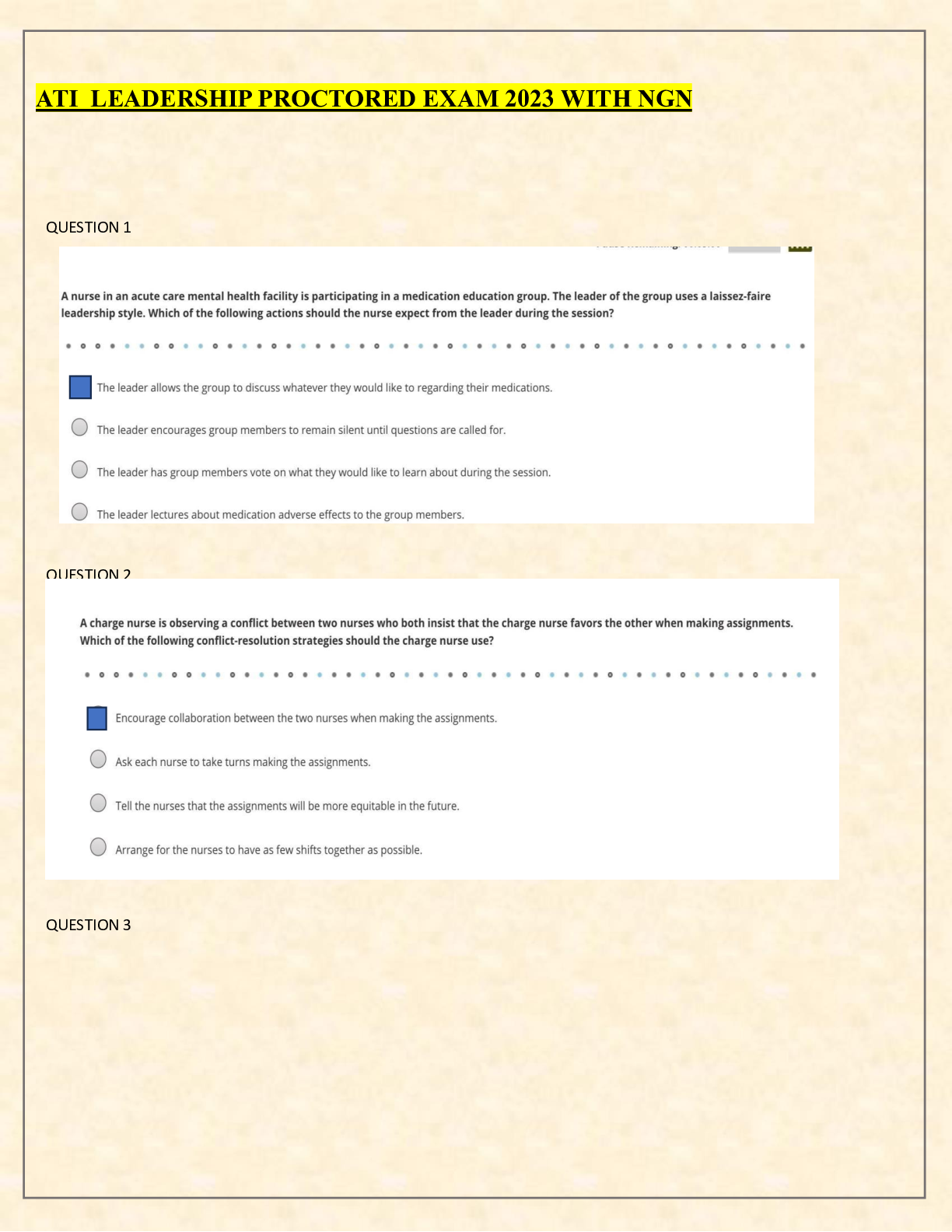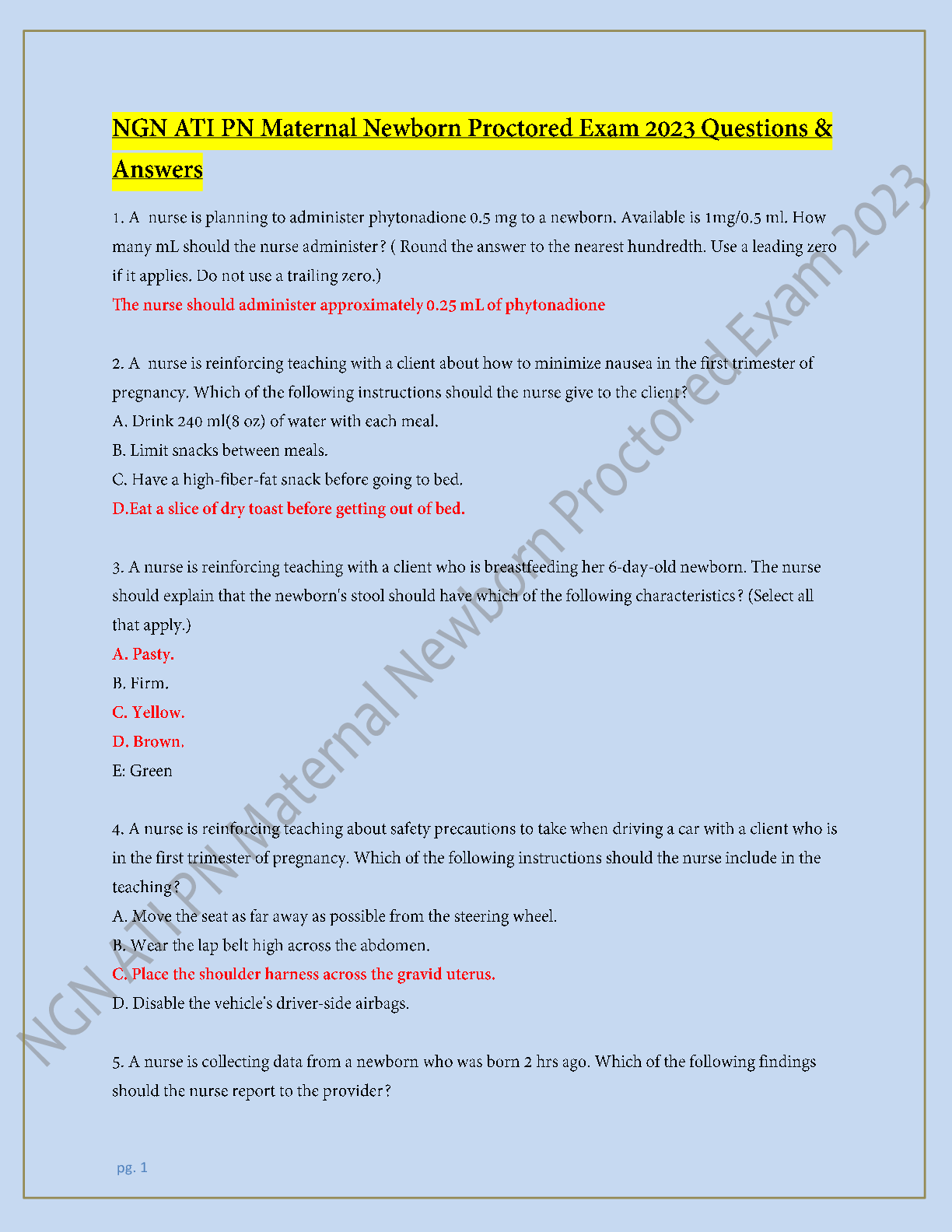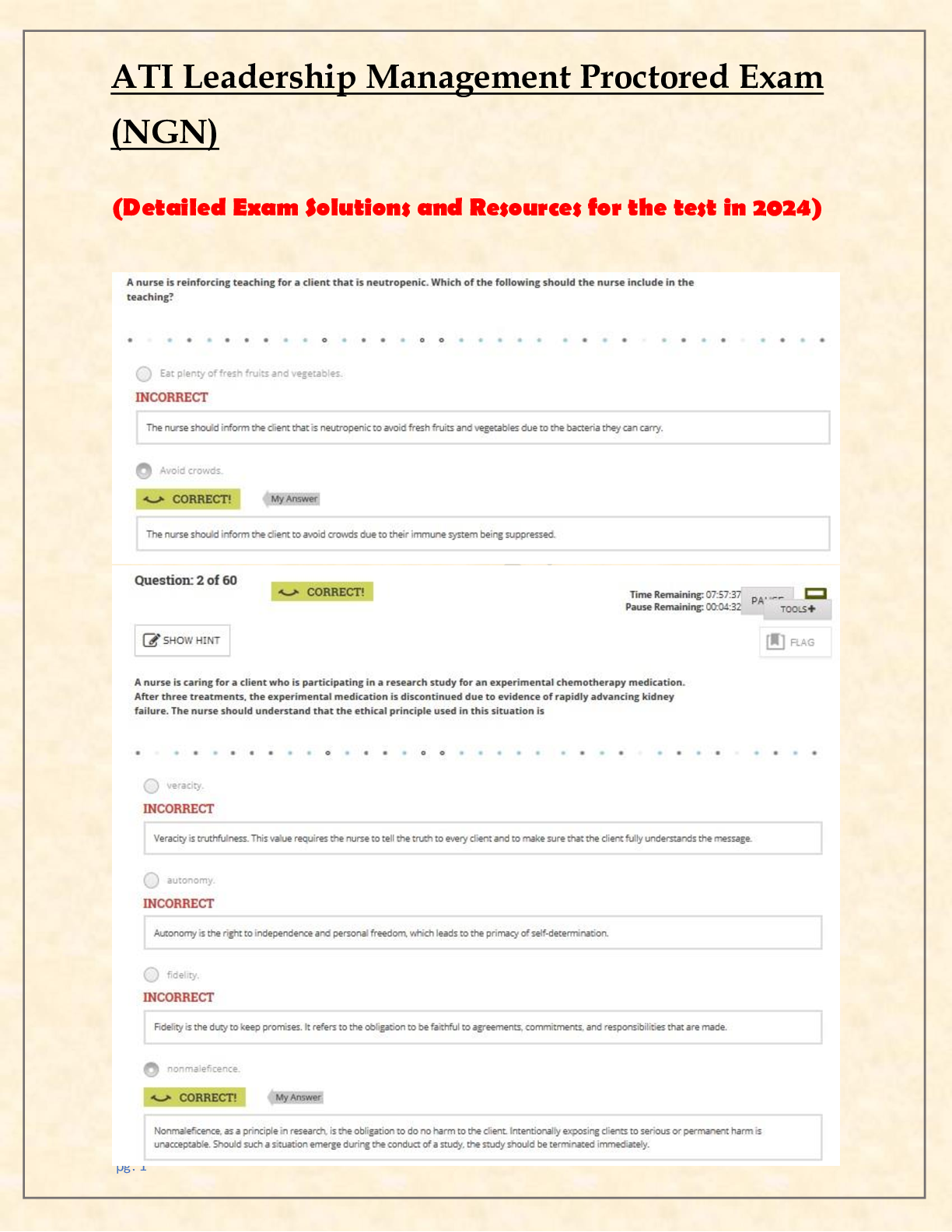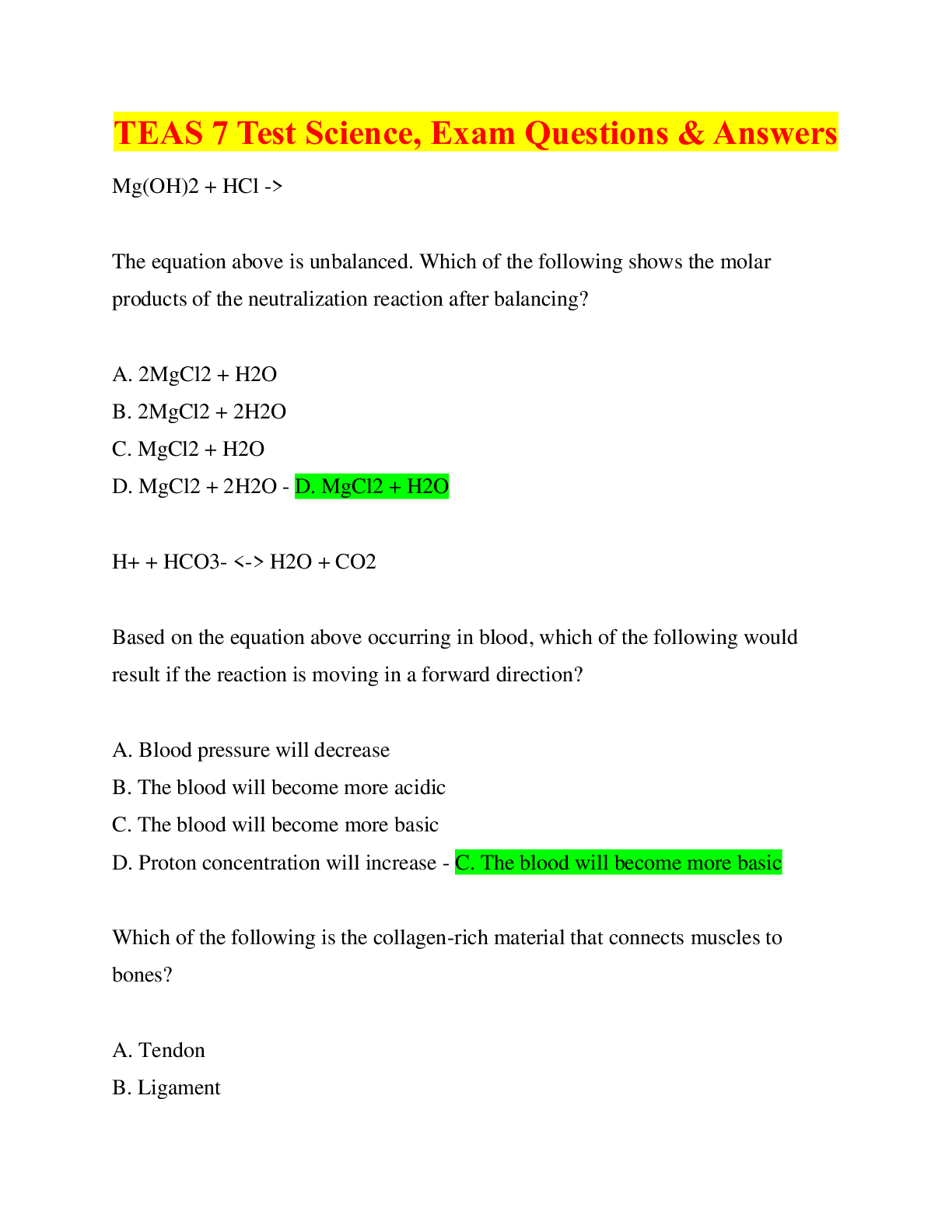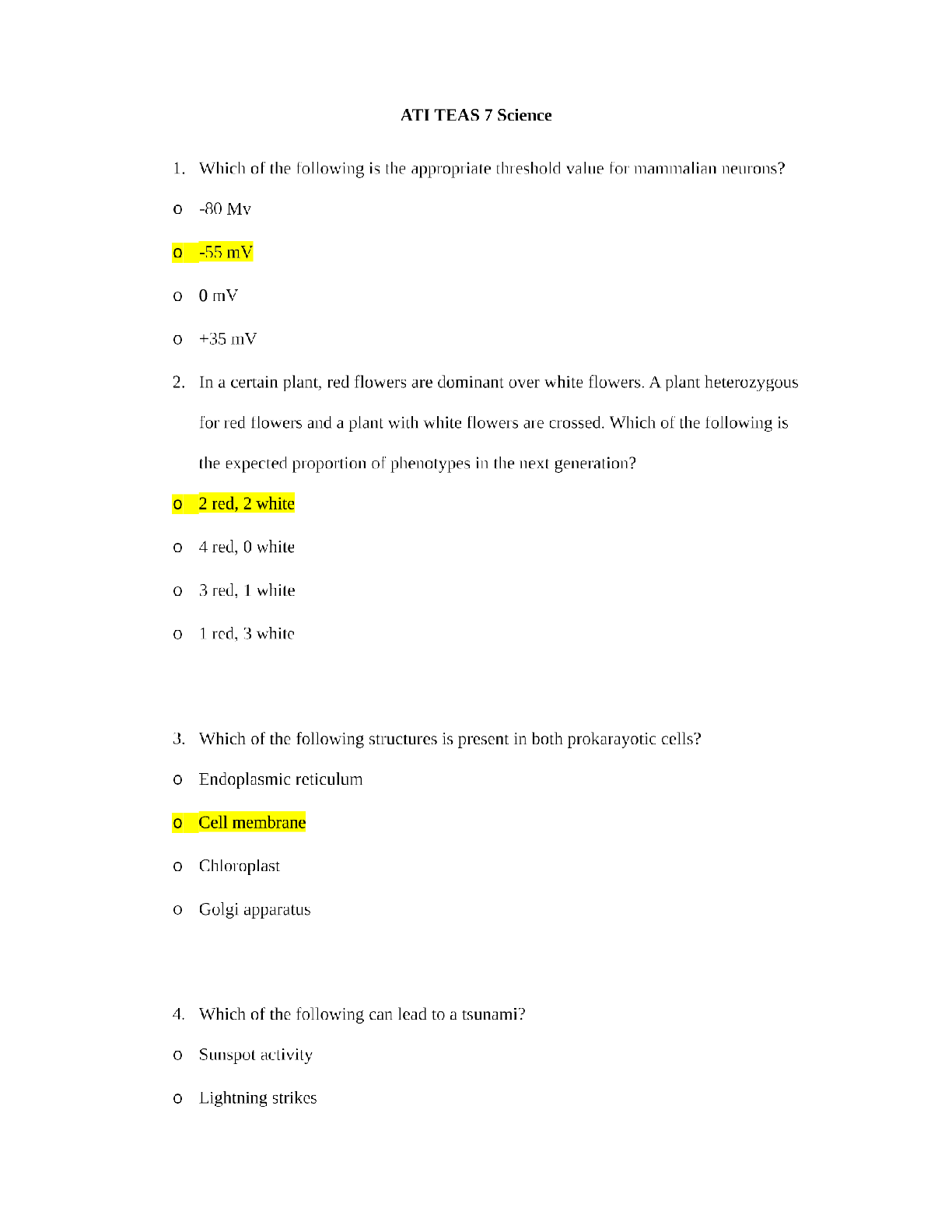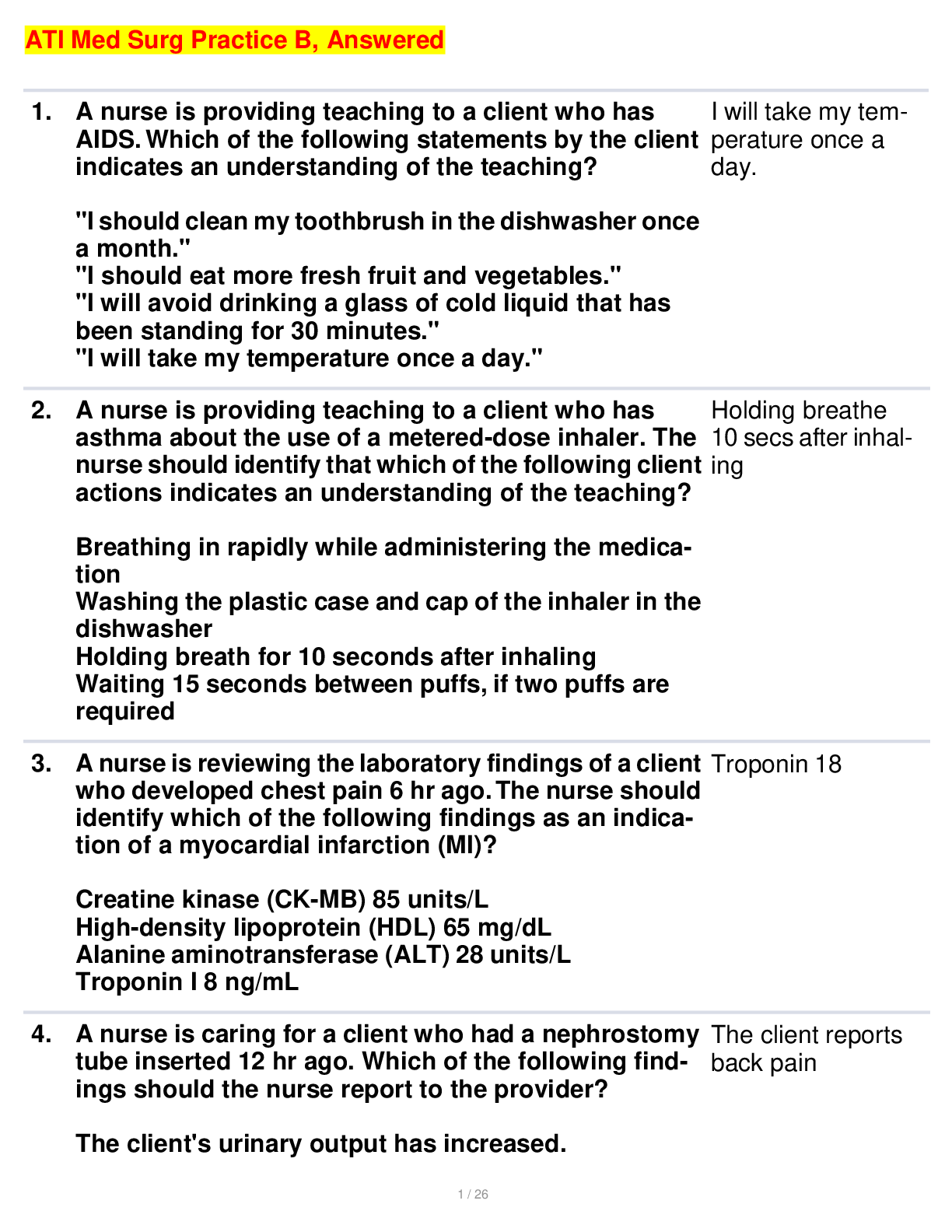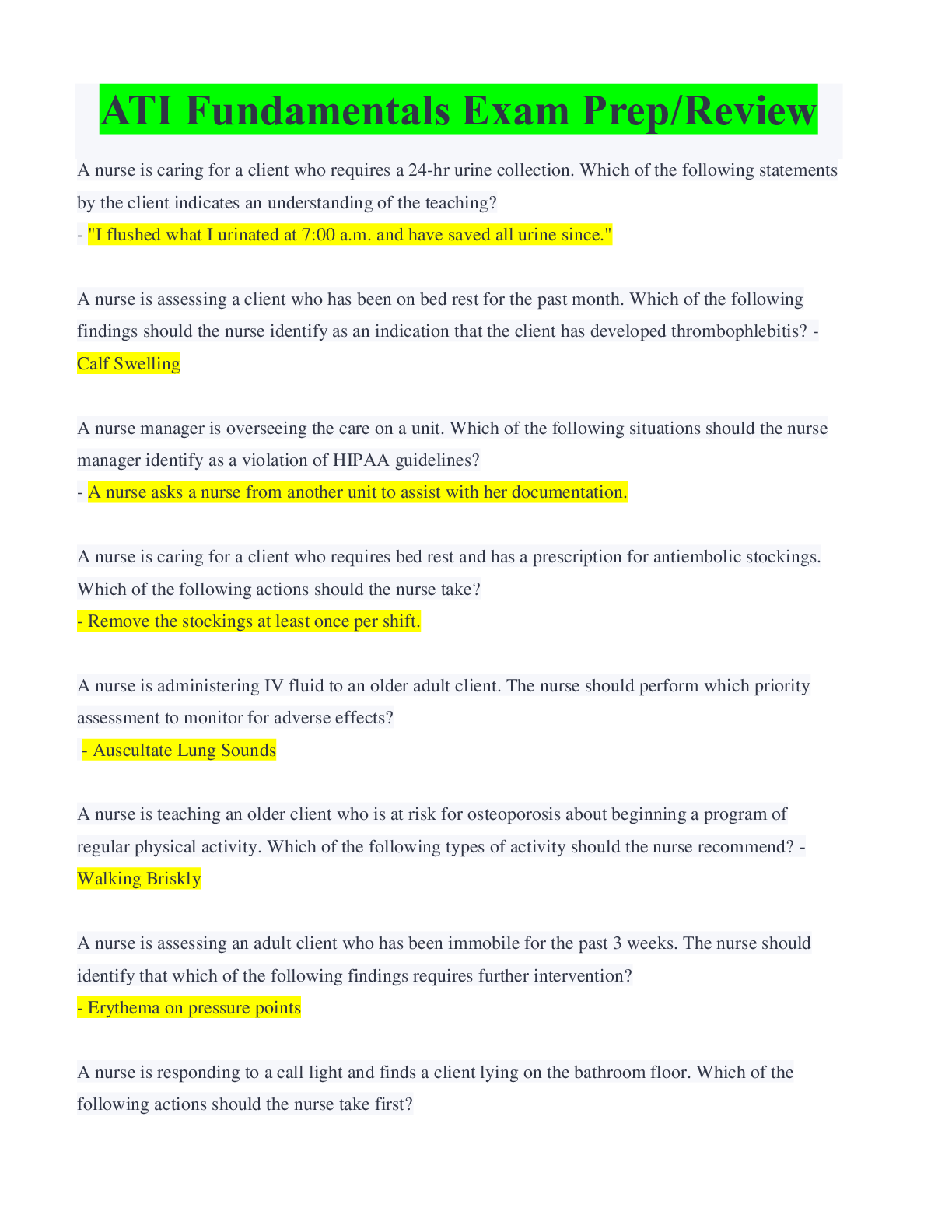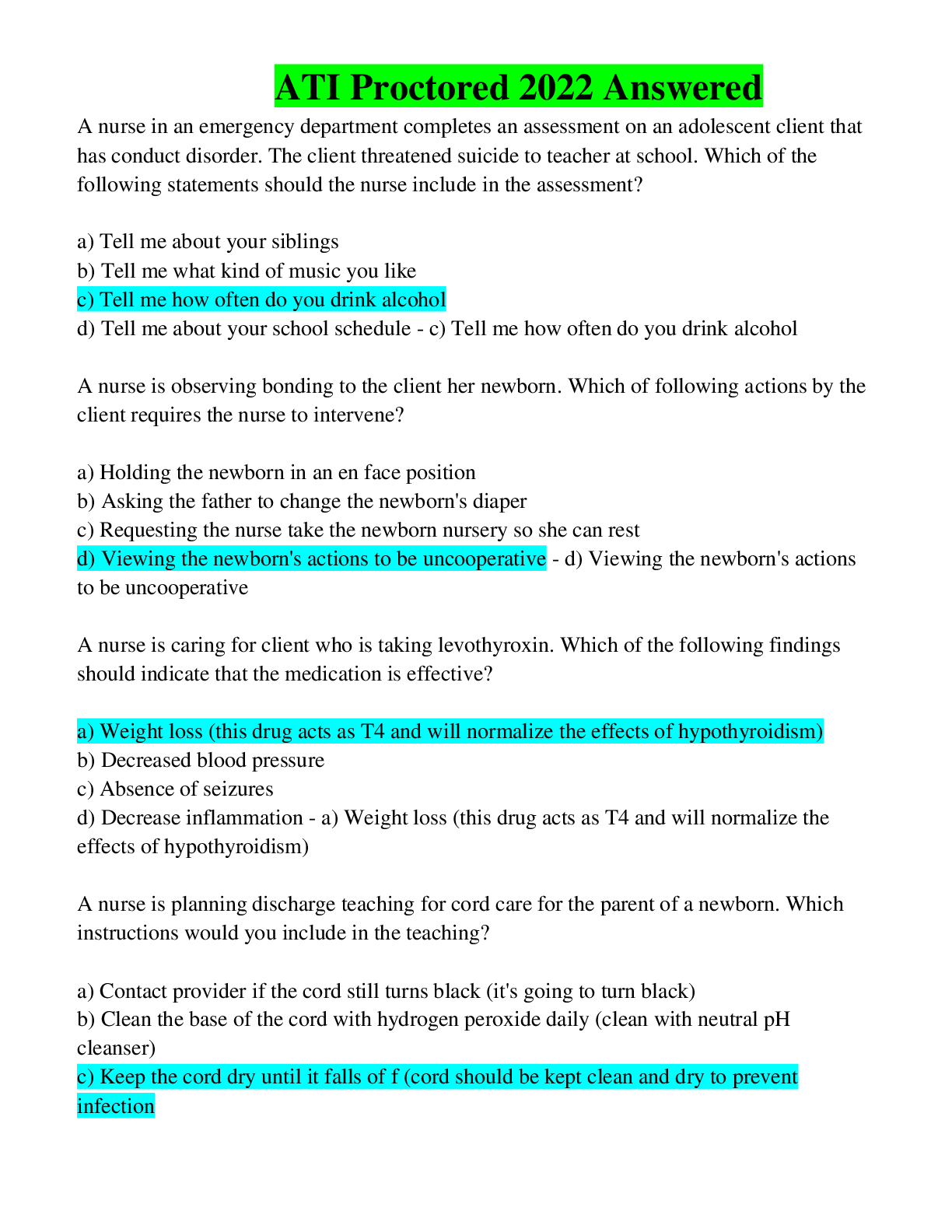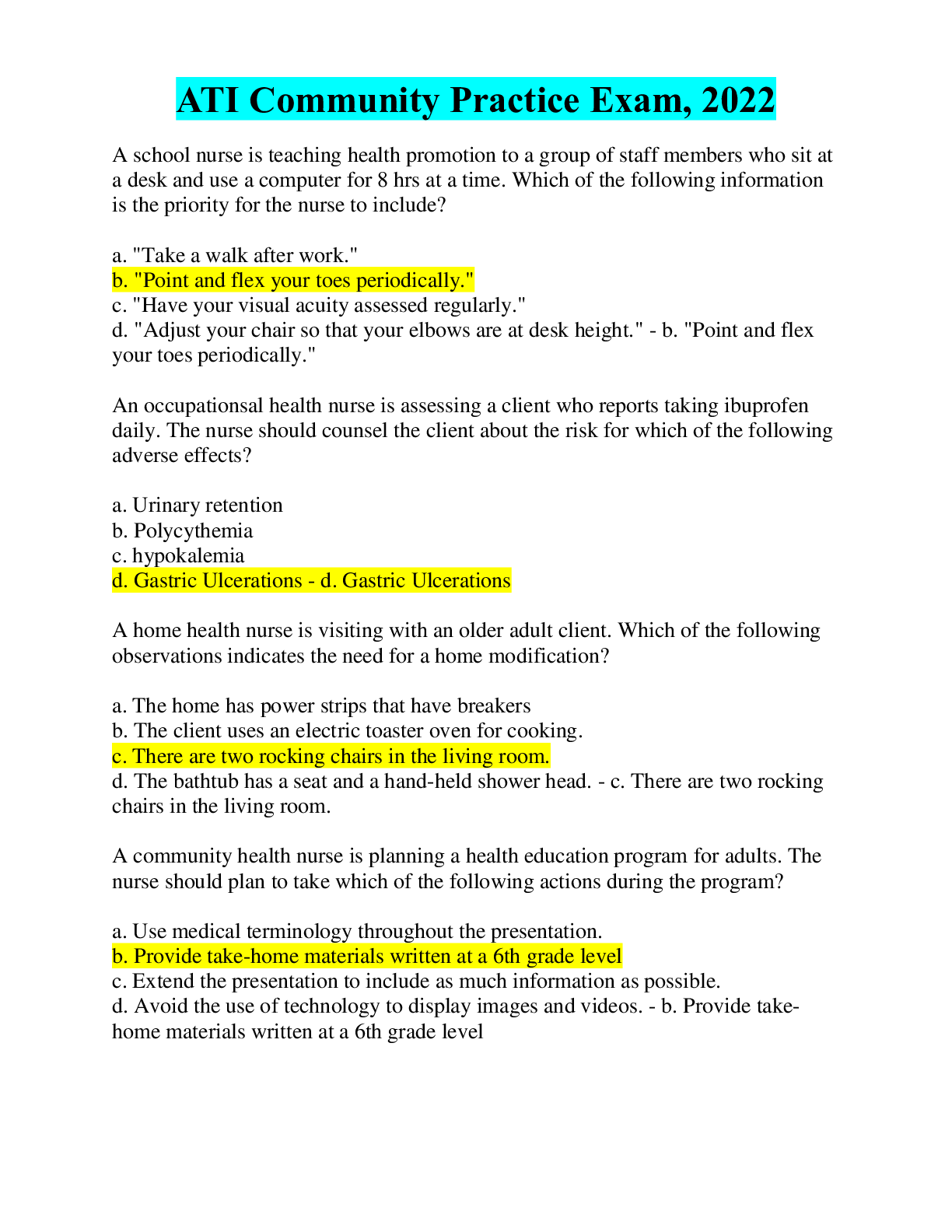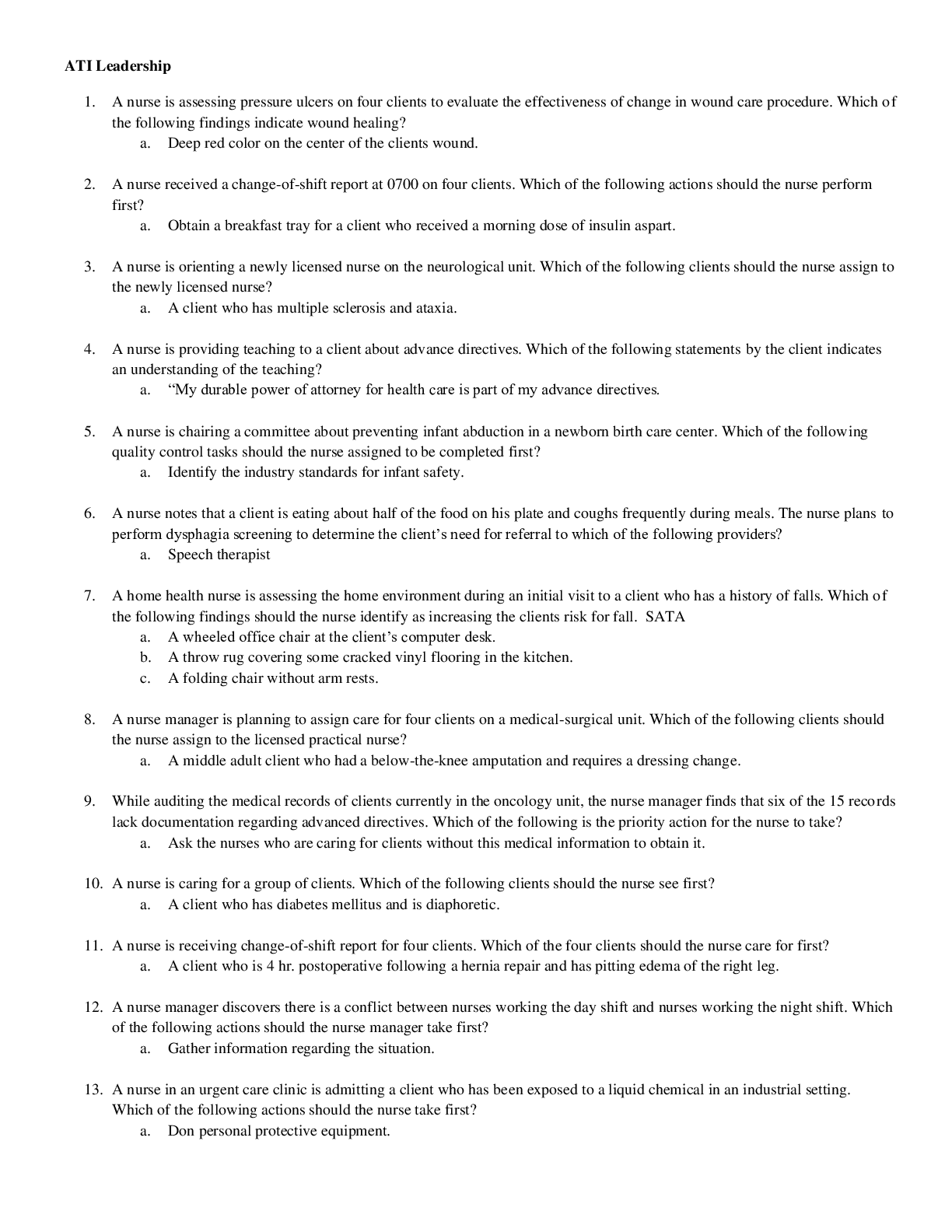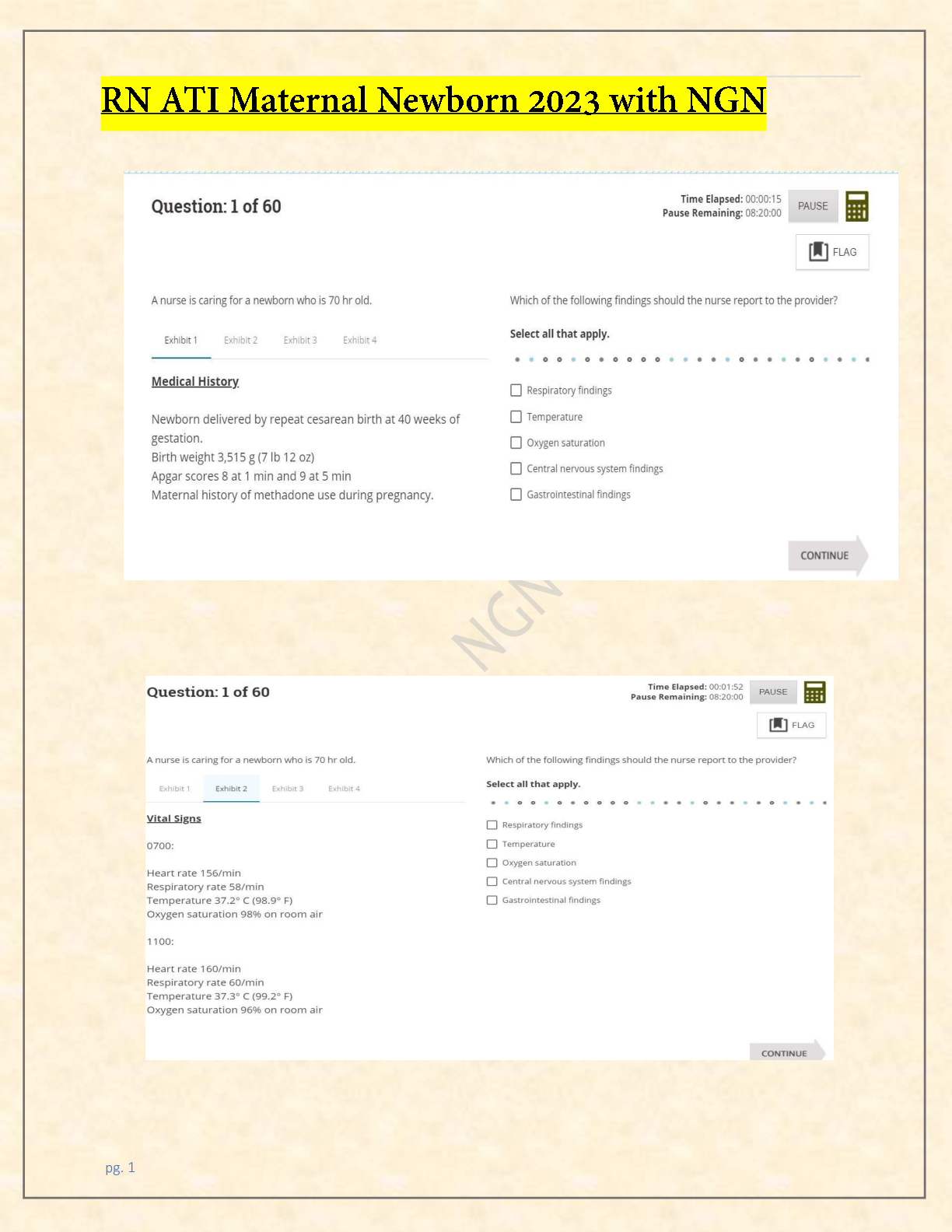ATI: Mental Health Proctored quiz bank 2022./2023 Graded A
Document Content and Description Below
ATI: Mental Health Proctored quiz bank 2022 A nurse is assisting with the planning of a therapeutic support group for individuals who have bulimia nervosa. Which of the following tasks should the nu... rse include during the orientation phase of group development? A. determine the rules that the group will follow B. address disagreements among group members C. help clients work through the grief response D. transition from the role of leader to facilitator -Answer- determine the rules that the group will follow *during the orientation phase of group development, the nurse should determine the rules that apply to the group and ensure that all members understand these rules. Examples of rules to be discussed include confidentiality and meeting times. A nurse is providing support for a client who is grieving the loss of her mother who died from Alzeimer's disease. Which of the following statements should the nurse offer? A. "I know how you must be feeling. I recently lost my father." B. "Dealing with your mother's death must be difficult for you." C. "Knowing your mother is in a better place provides you with some comfort." D. "I want you to let me know what I can do to help you cope with your mother's death." -Answer- "Dealing with your mother's death must be difficult for you." *The nurse should use therapeutic communication when supporting a client who is grieving. This statement keeps the focus of the conversation on the client by acknowledging her grief and encourages further communication." A nurse in the emergency room is collecting data from a client who has heroin intoxication. Which of the following findings should the nurse expect? A. Seizure activity B. Respiratory depression C. Hypersensitivity to pain D. Increased mental alertness -Answer- Respiratory depression *Heroin is an opioid; therefore, the nurse should expect this client who has heroin intoxication to exhibit respiratory depression. A nurse on a mental health unit is caring for a client who is displaying signs of anger. Which of the following pieces of information about the client is the strongest indicator that the client might become aggressive? A. The client has marginal coping skills B. The client has a history of violenceC. The client feels powerless after being hospitalized D. The client blames others for her problems -Answer- The client has a history of violence *The client's history of violence is the most important indicator that this client might become violent; therefore, this is the strongest indicator of potential aggressiveness. A nurse is reinforcing teaching with the caregiver of a client who has dementia. Which of the following instructions should the nurse include in the teaching? A. Offer the client a list of activities to choose from B. Offer finger foods to the client C. Discourage naps throughout the day D. Turn on the television when the client is in the room -Answer- Offer finger foods to the client *The caregiver should offer finger foods that the client can eat without sitting down. Clients who have dementia often like to wander and walk off nervous energy, which can decrease anxiety and calm the client. A nurse is contributing to the plan of care for a client with bipolar disorder who has acute mania. Which of the following interventions should the nurse recommend including in the plan? A. Provide the client with a low-calorie, low-fat diet B. Encourage the client to have frequent rest periods C. Escort the client to daily group therapy D. Limit the client's intake of caffeinated beverages to 12 oz per day -AnswerEncourage the client to have frequent rest periods *The nurse should recommend encouraging frequent rest periods throughout the day to decrease the client's risk of exhaustion from the constant activity associated with acute mania. A nurse is reviewing the plan of care for a client who has bipolar disorder. Which of the following is an effect of using cognitive behavioral therapy (CBT) for a client who has bipolar disorder? A. Prevents the need for mood-stabilizing medications B. Helps the client deal with distorted thought processes C. Aids in communication among family members D. Replaces the need for lifestyle interventions -Answer- Helps the client deal with distorted thought processes *CBT assists the client with recognizing distorted thought processes that are maladaptive with regards to recovery. When experiencing mania, the client tends toview the future unrealistically as highly favorable. CBT assists the client in recognizing and challenging such unrealistic or "automatic" thoughts and can help the client and the health care team recognize early trends toward mania A nurse is caring for a client in a mental health facility and overhears the client discussing plans to harm her father-in-law physically when she is discharged. Which of the following interventions should the nurse take? A. Ask the client to sign a contract agreeing not to harm others B. Notify the provider of the client's threat C. Keep the client's discussion confidential D. Place the client in individual observation -Answer- Notify the provider of the client's threat *It is the nurse's duty to notify the provider of the client's threat. It will then be the provider's responsibility to warn the the intended victim or the police of the client's threat A nurse is preparing to meet with a client who has borderline personality disorder. Which of the following actions should the nurse plan to take during the working phase of the therapeutic relationship? A. Introduce the concept of client confidentiality B. Establish goals with the client C. Define the roles of the nurse and the client D. Facilitate change in the client's behavior -Answer- Facilitate change in the client's behavior *The nurse should facilitate change in the client's behavior during the working phase of the therapeutic relationship. A nurse is contributing to the plan of care for a client who has suicidal ideation and is being transferred to the mental health unit. Which of the following interventions should the nurse recommend? A. Search the client and his belongings upon arrival B. Assign the client to a private room near the nurse's station C. Instruct assistive personnel to check on the client every 15 m in D. Keep the door to the client's room closed -Answer- Search the client and his belongings upon arrival *The nurse should plan to search the client and all of his belongings upon arrival to the unit. This search is conducted for the client's safety so that the nurse can identify and remove any objects that increase the client's risk of injury or suicide. Potentially harmfully objects include razors, shoelaces, hygiene products, and tweezersA nurse is talking with a client about his admission to a mental health unit. The client states, "I just don't know if I should be here. What will my family think?" Which of the following responses by the nurse uses the therapeutic communication technique of reflection? A. "It sounds like you are concerned about your family's reaction." B. "What your family thinks isn't important; you need to be concerned about getting well." C. "I suspect your family doesn't seem to understand you. D. "Many clients are concerned about the reaction of their families." -Answer- "It sounds like you are concerned about your family's reaction." *In a reflective response, the nurse directs feelings and statements back to the client, allowing the client to think about personal feelings A nurse is caring for a client who just received a terminal diagnosis of cancer. Which of the following initial reactions should the nurse expect from the client? A. Bargaining B. Depression C. Denial D. Anger -Answer- Denial *The nurse should expect the client to deny the reality of the diagnosis initially. This is a protective reaction seeking to avoid psychological pain A nurse is reinforcing teaching with the parent of a child who has a new prescription for methylphenidate to treat ADHD. Which of the following instructions should the nurse include in the teaching? A. "Weigh your child 3 times per week." B. "Expect your child to experience dark-colored stools." C. "Administer this medication at bedtime." D. "You should limit your child's intake of caffeine." -Answer- "Weigh your child 3 times per week." *The nurse should instruct the parent to weigh the child 2 to 3 times per week. Weight loss is an adverse effect of this medication. If significant weight loss occurs, the parent should notify the provider. A nurse is reinforcing teaching with a client who has generalized anxiety disorder and a new prescription for venlafaxine. Which of the following statements should the nurse make? A. "This medication is only for short-term use" B. "This medication can be taken on an as-needed basis."C. "This medication will effectively reduce your physical manifestations of anxiety." D. "This medication should not be stopped abruptly." -Answer- "This medication should not be stopped abruptly." *The nurse should instruct the client that stopping venlafaxine abruptly will lead to manifestations of withdrawal. A nurse is reinforcing teaching with a client who has bipolar disorder and a new prescription for valproic acid. The nurse should explain that the provider will routinely prescribe which of the following tests while the client is taking valproic acid? A. Electrocardiogram B. Chest X-ray C. Thyroid function tests D. Liver function levels -Answer- Liver function levels *The nurse should inform the client of the need to monitor liver function levels regularly due to the risk of hepatotoxicity while taking valproic acid. It is is recommended to obtain baseline levels and then repeat testing every 2 months during the first 6 months of therapy. A nurse is caring for a client who is taking carbamazepine. The nurse should monitor the client for which of the following adverse effects of carbamazepine? A. Thrombocytopenia B. Weight loss C. Polyuria D. Insomnia -Answer- Thrombocytopenia *The nurse should monitor the client for thrombocytopenia (an increased risk of bleeding). The nurse should monitor for bleeding of the gums, which can indicate thrombocytopenia, and notify the provider if this occurs. A nurse in a provider's office is collecting data for a client who has been taking donepezil for Alzheimer's disease. The data indicate that the client's disease is progressing and becoming more severe. Which of the following medications should the nurse expect the provider to prescribe? A. Megestrol B. Galantamine C. Memantine D. Haloperidol -Answer- Memantine *As Alzheimer's disease progresses and becomes more severe, memantine is added to the medication regimen. The medication is an n-methyl-D-aspartate antagonist, which can enhance cognition. It does not cure Alzheimer's diseaseA nurse is contributing to the plan of care for a newly admitted client who has bipolar disorder and is experiencing acute mania. Which of the following client goals should the nurse identify as the priority? A. Practicing problem-solving skills B. Understanding the medication regimen C. Identifying indications of relapse D. Maintaining adequate hydration -Answer- Maintaining adequate hydration *The priority goal for this client is to prevent physical exhaustion, maintain health, and meet nutritional and rest needs during the acute phase of the client's manic episode. A nurse is collecting data from a client who has schizophrenia. Which of the following statements by the client should the nurse recognize as an erotomaniac delusion? A. "My coworker is trying to poison me because he is afraid I'll take his job." B. "I have only met Jenny twice, but I know she'll love me." C. "I am selling my house before the earthquake hits in May." D. "The foil on my walls prevents the government from controlling me." -Answer- "I have only met Jenny twice, but I know she'll love me." *The nurse should recognize that a client who believes another person desires him or her romantically after meeting only a few times is demonstrating an erotomaniac delusion A nurse is caring for an adolescent male client who has anorexia nervosa. The client asks, "Have I done any permanent damage to my body?" Which of the following responses should the nurse make? A. "What concerns do you have about your physical health?" B. "Let's wait to discuss that after you're feeling better." C. "Unconsciously, you're saying that you're worried about your physical appearance." D. "I'm glad you're concerned about the physical effects of your illness." -Answer- "What concerns do you have about your physical health?" *The nurse should use therapeutic communication when discussing the client's concerns. This statement by the nurse is an example of exploring, which encourages the client to talk further about personal feelings and perceptions A nurse is reinforcing teaching with a client who has a new prescription for lorazepam to treat alcohol withdrawal. Which of the following should the nurse identify as an adverse effect of lorazepam that the client should report to the provider? A. Increased thirst B. SweatingC. Blurred vision D. Facial flushing -Answer- Blurred vision *The nurse should inform the client that blurred vision is an adverse effect of lorazepam and instruct the client to notify the provider if this occurs A nurse is caring for a client who is dying. The client's son appears visibly upset when he visits. Which of the following statements should the nurse make to the client's son? A. "Tell me how you're feeling about your mother's illness." B. "Consider bringing a support person when you visit your mother." C. "It is okay to feel angry when losing someone close to you." D. "You should think about joining a grief support group." -Answer- "Tell me how you're feeling about your mother's illness." *The nurse is using a therapeutic communication technique of offering a general lead to allow the son to express his feelings. This statement indicates that the nurse is interested in not only the client but also the client's family A nurse in a provider's office is reviewing the medical history of a client who asks about the use of varenicline for smoking cessation. Which of the following items in the client's medical history indicates a precaution for the use of varenicline? A. The client has type 1 diabetes mellitus B. The client has a history of depression C. The client has rheumatoid arthritis D. The client has a history of GERD -Answer- The client has a history of depression *The nurse should recognize that varenicline can cause mood changes and thoughts of suicide. Precautions should be taken when prescribing this medication to clients who have a history of psychiatric disease such as depression A nurse is reinforcing teaching with a client who has a new prescription for varenicline for smoking cessation. Which of the following statements by the client indicates an understanding of the teaching? A. "If I fail to stop smoking after 12 weeks, I will have to try another product." B. "I will take them medication for 7 days before I try to stop smoking." C. "This medication will cause me to lose weight as I stop smoking." D. "I will take the medication after eating a meal." -Answer- "I will take the medication after eating a meal." *The nurse should instruct the client that taking varenicline following a meal with a full glass of water will minimize the associated nauseaA nurse is collecting data from a client who was recently admitted for treatment of major depressive disorder (MDD). Which of the following findings should the nurse expect the client to report? (Select all that apply) A. Difficulty sleeping for several weeks B. Inability to concentrate on simple tasks C. Desire for sexual activity with multiple partners D. Not bathing for several days E. Lack of enjoyment from a long-time hobby of gardening -Answer- 1. Difficulty sleeping for several weeks 2. Inability to concentrate on simple tasks 3. Not bathing for several days 4. Lack of enjoyment from a long-time hobby of gardening *The nurse should expect a client who has MDD to report either difficulty sleeping or excessive, indecisiveness and an inability to concentrate, a lack of personal hygiene and self-care, and anhedonia, which is the inability to feel pleasure or happiness from a hobby or activity that once provided these positive feelings A nurse on an acute care mental health unit is collecting data from a client who was admitted following an opioid overdose. The client states that he wants his admission to remain confidential. Which of the following responses should the nurse make? A. "There is no way we can keep the details of your admission a secret from other people." B. "Being admitted as a confidential client will cost extra." C. "Only the staff involved in your care will know the details of your admission." D. "We will only release information about your admission to your family members." - Answer- "Only the staff involved in your care will know the details of your admission." *Keeping the details of a client's admission and care confidential is a legal requirement as as part of the nurse's ethical duty. The nurse should inform the client that only members of the staff who are involved in his care will have access to information about his admission and treatment A nurse on a mental health unit is preparing to discharge a client who has bulimia nervosa. Which of the medications should the nurse expect the provider to prescribe for the client? A. Paroxetine B. Fluconazole C. Bupropion D. Fluoxetine -Answer- Fluoxetine *The nurse should expect the provider to prescribe fluoxetine for a client who has bulimia nervosa. It is an SSRI used most frequently for the treatment of depression. It isthought to assist in the treatment of binge eating associated with bulimia by decreasing the craving for carbohydrates. It is prescribed for bulimia at 3 times the dosage that is used for the treatment of depression A nurse is reinforcing teaching with the guardian of a female adolescent client who has bulimia nervosa. Which of the following statements by the guardian indicates an understanding of the teaching? A. "My daughter is at risk for developing high blood pressure." B. "It is important for my daughter to have regular dental checkups." C. "I should weigh my daughter daily for several weeks." D. "Bleeding during my daughter's periods will increase." -Answer- "It is important for my daughter to have regular dental checkups." *For a client who has bulimia nervosa, repeated vomiting erodes tooth enamel and predisposes the teeth to caries. Therefore, frequent checkups are essential. A nurse is caring for a client who has schizophrenia and is experiencing auditory and visual hallucinations. Which of the following actions should the nurse take? A. Ask the client what the voices are saying B. Encourage the client to use reality testing C. Limit the client's exposure to noise D. Place the client in seclusion -Answer- Encourage the client to use reality testing *A client who is experiencing hallucinations can become frightened or agitated. The nurse should encourage the client to perform reality testing during periods of hallucinations by looking at the faces of other clients in the area. If the other clients do not appear frightened, the client should identify that the perception is a hallucination and not real. A nurse at a long term care facility hears an assistive personnel (AP) talking with an older adult client who has dementia with periods of confusion. Which of the following statements indicates that the AP requires further instructions? A. "We will be serving breakfast in 10 min. I will stay here while you get ready." B. "It's Monday morning. I know that your favorite television shows are on this evening." C. "I see that you have a new photo on the wall. Can you tell me who that girl is?" D. "It's almost time for your appointment. Let me do your hair for you and brush your teeth." -Answer- "It's almost time for your appointment. Let me do your hair for you and brush your teeth." *When a client with dementia has periods of confusion, the AP should allow the client additional time to complete activities that can be performed independently. Insisting on completing the task for the client or attempting to hurry her can provoke agitation. TheAP should encourage independence and provide assistance only if the client asks for or needs it A nurse is reinforcing teaching with a client who has anxiety and a new prescription for diazepam. Which of the following statements should the nurse make? A. "Feelings of sedation should resolve in about 1 week." B. "There is no risk of physical dependence with this medication." C. "You can decrease the dose when you feel especially anxious." D. "It will take several months for you to feel the maximum benefit maximum benefit of the medication." -Answer- "Feelings of sedation should resolve in about 1 week." *Adverse effects of diazepam and other benzodiazepines are sedation and psychomotor slowing. The nurse should inform the client that these effects should subside in 7 to 10 days." A nurse is teaching with a client in the day room of an acute care mental health facility. The client accuses the nurse of being "too bossy" and states the nurse does not have the right to pressure anyone. Which of the following responses should the nurse provide? A. "What makes you say that?" B. "Tell me what I said that made you feel uncomfortable." C. "Why are you feeling pressured by me?" D. "You shouldn't make negative statements since I'm trying to help you." -Answer- "Tell me what I said that made you feel uncomfortable." *This statement uses the therapeutic technique of exploring to ask the client to explain her feelings. This can help the client view the situation objectively, enabling the nurse to determine the client's thoughts and promoting trust between the client and nurse A nurse is caring for 4 clients in a community mental health facility. For which of the following clients should the nurse provide a tertiary care intervention? A. A client who has generalized anxiety disorder and reports increased anxiety and insomnia B. A client who is expressing hopelessness during a crisis C. A client who is recovering from a crisis and asks for help in completing the recovery process D. A client who is having difficulty coping with stress and wants to learn relaxation techniques -Answer- A client who is recovering from a crisis and asks for help in completing the recovery process *This client should receive tertiary care interventions such as a referral to community groups or facilities to complete recovery from a crisis. Tertiary care is designed to provide support for mental and physical healing after a crisis occursA nurse is assisting with the admission of a client who has alcohol use disorder. Which of the following statements indicates that the client is using denial as a coping mechanism? A. "I put in extra hours at work so I won't think about drinking." B. "I know that wine is good for my heart, so that's why I drink some each evening." C. "I make up for my drinking by taking my partner on nice vacations." D. "I am able to go to work every day, so I don't have a problem." -Answer- "I am able to go to work every day, so I don't have a problem." *Insisting that drinking is not a problem because the client can go to work every day indicates the defense mechanism of denial. This allows the client to ignore the existence of an alcohol use disorder A nurse is caring for a client who has dementia and paces during meals. Which of the following actions should the nurse take? A. Restrain the client during meals B. Offer a large meal to the client at bedtime C. Administer an antipsychotic medication D. Provide finger foods for the client -Answer- Provide finger foods for the client *The nurse should provide finger foods to encourage intake throughout the day and improve the client's nutritional status A nurse is assisting with a support group for clients who are nearing discharge from an acute care mental health facility. During a group session, a client states, "I'm scared about being discharged." Which of the following responses should the nurse offer? A. "Maybe you are not ready to be discharged yet." B. "Are there others in the group who have similar feelings they would like to share?" C. "You ought to be happy that you're being discharged." D. "How many in the group feel this member is not yet ready to be discharged?" - Answer- "Are there others in the group who have similar feelings they would like to share?" *Some of the goals of a support group include providing improved interpersonal relationships, mutual support, and methods to decrease stress. By asking if others in the group have similar feelings, the nurse allows the client to hear that feelings regarding discharge are not unique; also, the client might receive support from group members who express similar feelings A nurse in an acute mental health facility is caring for a client who states, "This place is ridiculous. I can't stand spending another day here!" Which of the following responses should the nurse make?A. "You should focus on the good things so the bad things seem less important." B. "I'm sure tomorrow will be a better day." C. "You shouldn't be so negative when you are young and physically healthy." D. "Let's talk for a while about the events of your day." -Answer- "Let's talk for a while about the events of your day." *The nurse should use focusing as a therapeutic communication technique that encourages the client to talk about feelings. A nurse on a mental health unit is caring for a client who has antisocial personality disorder and is becoming increasingly loud and belligerent. Which of the following approaches should the nurse use to manage this client's behavior? A. Confront the client for breaking the rules B. Stand close to the client to offer comfort and support C. Speak to the client with clear, calm, caring statements D. Escort the client to the nurse's station -Answer- Speak to the client with clear, calm, caring statements *To remain in control of the situation, the nurse should use clear, calm statements that are nonthreatening to the client. The nurse should also set limits for clients who exhibit potentially violent behavior A nurse is assisting with the care of a client who has a terminal illness. The client yells at the nurse, "Get out of my sight. You've always bothering me about something!" Which of the following responses should the nurse offer? A. "You don't have to yell. I'm sorry you feel like I've bothered you." B. "I'll go, but I'll be back in a little while when you have calmed down." C. "I'm going to have to ask you to be quieter since there are other clients on this unit." D. "I'll be here if you would like to talk about how you feel." -Answer- "I'll be here if you would like to talk about how you feel." *This response by the nurse acknowledge the client's feelings and provides a mechanism for further conversation, which helps create and maintain a therapeutic relationship between the nurse and the client A home health nurse is talking with the partner of a client who has dementia. Which of the following statements by the partner indicates that the client is displaying signs of apraxia? A. "Yesterday, my partner put on a jacket upside down." B. "My partner has trouble reading the newspaper." C. "My partner often repeats words."D. "Last week, my partner did not recognize the sound of the alarm clock." -Answer- "Yesterday, my partner put on a jacket upside down." *The nurse should recognize that this statement is an indication that the client is experiencing apraxia (the lack of ability to accomplish once known tasks). This manifestation is considered a cognitive deficit because there is no loss of motor or sensory ability. A nurse in an acute mental health facility is assisting with the plan of care for a client who has obsessive-compulsive disorder (OCD). Which of the following actions should the nurse recommend? A. Encourage the client to focus on personal hygiene B. Limit the hours the client sleeps each day C. Instruct the client to practice thought-stopping D. Make negative statements about the client's behavior -Answer- Instruct the client to practice thought-stopping *The nurse should suggest thought-stopping as an intervention for this client who has OCD. By saying "stop" out loud, the client can learn to interrupt obsessive thought. A nurse is collecting data from a client who has cocaine intoxication. Which of the following findings should the nurse expect? A. Low blood pressure B. Increased mental alertness C. Flat affect D. Decreased body temperature -Answer- Increased mental alertness *The nurse should expect a client who has cocaine intoxication to have increase mental alertness due to the substances stimulant properties A nurse is preparing to care for a client who was brought to a community health facility by her caregiver, who states that the client refuses to eat. The nurse notes the client has lost weight, avoids making eye contact, and defers questions to the caregiver. Which of the following actions should the nurse take? A. Make sure the caregiver is present when interviewing the client B. Document how the caregiver responds when told that the client looks neglected C. Ask the client why she refuses to eat the caregiver's food D. Identify sources of stress for the caregiver -Answer- Identify sources of stress for the caregiver A nurse on an acute mental health unit is caring for a client who is experiencing a manic episode with agitation. Which of the following actions should the nurse take?A. Schedule the client for group therapy B. Discourage the client from napping during the day C. Encourage the client to participate in physical activity D. Allow the client to spend time alone -Answer- Encourage the client to participate in physical activity *Offering the client who is experiencing a manic episode an opportunity for physical activity can decrease stress and provide an outlet for the client's excessive energy and agitation A nurse is reinforcing teaching about stress management with a client who is experiencing anxiety. Which of the following techniques should the nurse recommend to assist the client in identifying his stressors? A. Biofeedback B. Intellectualization C. Journaling D. Cognitive reframing -Answer- Journaling *Journaling is a technique that can be used to identify stressors. By recording feelings and responses to events, the client can find the source of everyday stressors and begin the process of stress reduction A nurse is reinforcing teaching with a client who has bipolar disorder and a new prescription for lithium. Which of the following directions should the nurse provide? A. Decrease sodium intake while taking lithium B. It may take 5 days before the medication is effective C. Take the medication on an empty stomach D. Increase the fluid intake to 2000 mL (67.6 oz) daily -Answer- Increase the fluid intake to 2000 mL (67.6 oz) daily *The client should consume 1500 to 3000 mL (50.7 to 101.4 oz) of fluid daily A nurse is reinforcing teaching with a client who has a prescription for a tricyclic antidepressant. Which of the following instructions should the nurse share? A. "Take this medication within 1 hour of waking each morning." B. "Limit your alcohol intake to 2 drinks per week while taking this medication." C. "It can take 6 weeks to achieve the full therapeutic effect of this medication." D. "Stop taking the medication if you experience dizziness." -Answer- "It can take 6 weeks to achieve the full therapeutic effect of this medication." *The nurse should instruct the client that it can take 6 to 8 weeks to achieve the full therapeutic effectiveness of a tricyclic antidepressantA nurse is interacting with a client who has a psychotic disorder when the client suddenly turns her head as if listening to something and says, "The boss says she is going to hit me with a stick!" Which of the following responses should the nurse offer? A. "The boss can't hurt you with that stick B. "Why are you talking to yourself?" C. "I don't see anyone, but it sounds like you are frightened." D. "There isn't anyone here but you and me, so you need to explain." -Answer- "I don't see anyone, but it sounds like you are frightened." *The nurse should respond by offering personal perceptions of the client's experience and should address the client's underlying emotions about the hallucination A nurse is caring for a client who attends family counseling with his partner and their children. The client tells the nurse that he isn't going to attend any further sessions and states, "I don't have time for all that talking." Which of the following responses should the nurse provide? A. "It must be difficult for you to talk about family problems." B. "You should continue attending the family counseling sessions until the therapist tells you to stop." C. "If you continue to go to family counseling, I'm sure you'll be able to resolve your family problems soon." D. "I think you need to continue family therapy if your partner and children want to receive further counseling." -Answer- "It must be difficult for you to talk about family problems." *The nurse's response indicates empathy for the client's feelings and is an example of the therapeutic communication technique of verbalizing what the client implied. With this technique, the nurse helps him focus on the actual reason for not wanting to continue family therapy A nurse is caring for a client who is having an acute panic attack. Which of the following actions should the nurse take? A. Speak to the client in a raised voice B. Walk the client to the dayroom C. Use repetition when speaking with the client D. Secure the client in his room alone -Answer- Use repetition when speaking with the client *A client who is having a panic attack might have a hard time understanding what the nurse is saying. Using simple phrases and repetition are effective methods of communicationA nurse in an urgent care clinic is collecting data from a client who reports recent cocaine use. Which of the following manifestations should the nurse expect? A. Hypertension B. Drowsiness C. Bradycardia D. Pinpoint pupils -Answer- Hypertension Cocaine is a central nervous system stimulant. Therefore, hypertension is an expected finding in a client who has recently used cocaine A nursing is preparing to administer alprazolam 4 mg PO divided equally every 12 hours for a client who has generalized anxiety disorder. The amount available is alprazolam 2 mg tab. How many tablets should the nurse administer per dose? -Answer- 1 tablet A nurse is heling evaluate the plan of care for a client who has antisocial personality disorder. Which of the following client actions indicates that he is making progress with the treatment? (select all that apply) A. Assisting another client who has depression to fill out a menu B. Nominating himself to chair the client government meeting C. Requesting a weekend pass to go home D. Serving as the judge for a unit talent show E. Informing the nurse that the staff provides excellent care to clients -Answer- 1. Assisting another client who has depression to fill out a menu 2. Requesting a weekend pass to go home *Clients who have antisocial personality disorder tend to lack empathy for others and often display an inability to connect with others. Assisting another client indicates the client's willingness to help and connect with others and demonstrates rules and have a lack of respect for authority. Requesting a weekend pass indicates the client's willingness to follow unit rules and demonstrates progress with treatment A nurse is collecting data from a client who is experiencing opioid withdrawal. Which of the following clinical manifestations should the nurse expect? A. Sedation B. Rhinorrhea C. Bradycardia D. Hypothermia -Answer- Rhinorrhea *The nurse should expect this client who is experiencing opioid withdrawal to have rhinorrhea and flu-like manifestations such as yawning, sneezing, and abdominal pain A nurse is reinforcing teaching with the family of a client who has Alzheimer's disease about donepezil. Which of the following statements should the nurse include?A. "Donepezil can improve cognitive functioning during the earlier stages of the disease." B. "Donepezil cures the disease process if it is started upon first recognition of dementia." C. "Donepezil provides long-term reversal of memory loss in the last phase of the disease." D. "Donepezil accelerates the breakdown of acetylcholine within the client's brain." - Answer- "Donepezil can improve cognitive functioning during the earlier stages of the disease." *The nurse should inform the client's family that donepezil is used to treat the manifestations of mild to severe Alzheimer's disease. Although donepezil does not prevent the progression of Alzheimer's disease, it is intended to prolong the client's ability to function in the early stages of the disease A nurse is teaching a client who has schizophrenia about involuntary commitment. Which of the following statements should the nurse identify as an indication that the client understands the teaching? A. "My family cannot commit me because I am homeless." B. "Even when I'm calm, I'll be forced to take psychotropic medication." C. "At least 2 doctors must support the commitment application." D. "At least 2 doctors must support the commitment application." -Answer- "At least 2 doctors must support the commitment application." *Involuntary commitment is a court-ordered mandate requiring admission of a client to receive mental health services either at an outpatient mental health facility. At least 2 doctors or other mental health professionals must agree that the client should be involuntarily committed to ensure due process and avoid accidentally committing the client A nurse is teaching a client who has seasonal affective disorder (SAD) about the use of light therapy. Which of the following statements should the nurse make? A. "Light therapy suppresses the natural nighttime release of melatonin." B. "You should plan your light therapy session before going to bed." C. "You should begin with 2-minute light therapy sessions and gradually progress to 10- minute sessions." D. "Light therapy is less effective at treating SAD than antidepressant medications." - Answer- "Light therapy suppresses the natural nighttime release of melatonin." *Melatonin is produced nocturnally by the pineal gland; larger amounts are produced during months containing more hours of darkness. These large amounts of melatonin seem to cause SAD in clients who are susceptible to this disorder. Light therapy isthought to improve depression by suppressing melatonin production and increasing serotonin production A nurse in a provider's office is reviewing the results of a mental status exam for a client who has early manifestations of dementia. Which of the following pieces of information from the examination describes the client's cognitive status? A. The client has a flight of ideas B. The client shows a deficit in recent memory C. The client has a flat affect D. The client is well groomed -Answer- The client shows a deficit in recent memory *This report about the client's memory describes the client's cognitive status. Other areas include orientation, level of consciousness, attention, and judgment A nurse is determining the total score for a client's Alcohol Use Disorders Identification Test (AUDIT) by assigning a score of 0 to 4 for each of the client's answers. For which of the following self-reported findings should the nurse assign the client a score of 4? A. The client's frequency of alcohol intake is typically 3 times per week B. The client misses work once a month because of his alcohol intake C. Alcohol intake does not cause the client to have feelings of guilt D. Last month, the provider suggested that the client reduce his alcohol intake -AnswerLast month, the provider suggested that the client reduce his alcohol intake *When determining a client's total score for the AUDIT self-reported version, the nurse should assign a score of 4 if the client indicates that a friend, relative, or health care provider recommended decreasing his alcohol consumption at least once during the last 12 months A nurse is caring for a client who has social anxiety disorder. Which of the following client statements should the nurse expect? A. "I am embarrassed to eat in public." B. "I often feel like I am going to have a heart attack." C. "I struggle to control my constant worry." D. "I have to step over the cracks in the sidewalk or else something bad might happen." -Answer- "I am embarrassed to eat in public." *The nurse should recognize that this statement describes social disorder. Clients who have this disorder experience severe anxiety or fear of behaving in a manner that can be negatively viewed by others. These clients attempt to avoid activities such as eating or speaking in public. If they are unable to avoid activities that trigger the anxiety, clients experience severe anxiety and emotional distressA nurse is speaking with a client whose partner was killed unexpectedly. The client states, "I just don't know what to do now." Which of the following actions should the nurse take? A. Talk to the client about available community resources B. Distract the client by discussing events not related to the crisis C. Reassure the client that he will feel better soon D. Give the client advice about what to do during the next few days -Answer- Talk to the client about available community resources *Initial steps should be taken to make a client who is experiencing a crisis feel safe and less anxious. The priority for the nurse is to ensure the client is safe, which includes assessing any thoughts of self-harm. After promoting client safety, the nurse should let the client know what personal and community resources are available. The nurse should determine the client's perception of the crisis, availability of support, and ability to cope with the crisis. A nurse is assisting with the care of a client who has a substance use disorder and was involuntarily admitted by court order for 90 days. When the nurse attempts to administer prescribed oral lorazepam to decrease the client's manifestations of withdrawal, the client aggressively refuses. Which of the following actions should the nurse take? A. Place the lorazepam on hold B. Request a prescription for IM lorazepam C. Request that another nurse attempt to administer the lorazepam D. Place the lorazepam in the client's food -Answer- Place the lorazepam on hold *Clients who are in a health care facility due to an involuntarily admission retain the right to refuse treatment, including prescribed medications. Therefore, the nurse should hold the medication, document the client's wishes in the medical record, and notify the provider of the refusal A nurse is reinforcing teaching with a client who has insomnia. Which of the following statements should the nurse make? A. "Limit daytime napping to an hour maximum." B. "Watch TV as you fall asleep." C. "If you aren't able to sleep, you can get out of bed and read a book." D. "Track the number of hours that you sleep each night." -Answer- "If you aren't able to sleep, you can get out of bed and read a book." *The nurse should instruct the client to get of bed and participate in a quiet activity such as reading until he feels sleepy, at which time he should return to bed. A nurse is caring for a client who has dementia. Which of the following actions should the nurse take?A. Assign the client several tasks at the same time B. Maintain a low-stimulation environment C. Advise family to visit frequently as a group D. Encourage the client to make choices regarding care -Answer- Maintain a lowstimulation environment *To minimize confusion and anxiety, the nurse should maintain a low-stimulation environment who has demenita A nurse is collecting data from a toddler who has a fractured arm. Which of the following findings should the nurse identify as a possible indication of physical abuse? A. The parent provides a history that is inconsistent with the child's injury B. The child is brought to the health care facility immediately following the injury C. The parent requests to remain present with the child throughout treatment of the injury D. The child clings to the parent when the nurse begins to examine the injury -AnswerThe parent provides a history that is inconsistent with the child's injury *The nurse should suspect possible abuse when the child's injury conflicts with the history of the injury reported by the parent A nurse is collecting fata from a client who was diagnosed with schizophrenia. The nurse should identify that which of the following findings is considered a positive symptom of schizophrenia? A. Hallucinations B. Social withdrawal C. Anergia D. Flat effect -Answer- Hallucinations *Positive symptoms fall into the following categories: content of thought, form of thought, perception, or sense of self. The nurse should identify that hallucinations fall under the category of perception and cause the client to experience sensory perceptions that are not associated with reality. Other positive symptoms include delusions, depersonalization, and concrete thinking A nurse is caring for a client who has schizophrenia and has been admitted to the mental health unit. The client has a history of aggression and has been continually pacing the hallway in an agitated manner over the past hour. Which of the following responses should the nurse make? A. "It's a beautiful day outside. Let's take a walk together." B. "Sit down so we can try a relaxation exercise." C. "Would you like your antianxiety medication now?"D. "You are pacing back and forth. Can you tell me what you are feeling?" -Answer- "You are pacing back and forth. Can you tell me what you are feeling?" *The first action the nurse should take using the nursing process is to collect data from the client. By asking the client to identify feelings of anxiety, the nurse promotes trust and can assist the client with decreasing anxiety before an episode of aggression occurs A nurse is caring for a client who has schizophrenia. Which of the following statements by the client indicates that the client is displaying cognitive symptoms? A. "I just feel so hopeless." B. "The government has been watching my house." C. "I am unable to remember to brush my teeth." D. "I no longer enjoy the activities I used to love." -Answer- "I am unable to remember to brush my teeth." *The nurse should recognize that memory impairment is a cognitive symptom of schizophrenia. Other cognitive symptoms include impaired concentration, judgment, and problem-solving A nurse in a community mental health facility is caring for a group of clients. Which of the following clients should the nurse identify as experiencing an adventitious crisis? A. A client who has a new diagnosis of severe bipolar disorder B. A client who is depressed following a devastating fire in her home C. A client who is experiencing acute grief following his father's death D. A client who is experiencing postpartum depression following the birth of her first child -Answer- A client who is depressed following a devastating fire in her home *The nurse should identify that a client who is experiencing depression following a house fire is experiencing an adventitious crisis. An adventitious crisis is unplanned and not a part of everyday life. The crisis can result from a natural disaster, a national disaster, or a crime of violence A nurse is collecting data from a client who takes an MAOI for the treatment of depression. Which of the following findings is the priority for the nurse to report to the provider? A. Elevated blood pressure B. Weight gain C. Muscle twitching D. 2+ peripheral edema -Answer- Elevated blood pressure *The greatest risk to the client is an elevated blood pressure, which increased the risk of a hypertensive crisis that can result from taking an MAOI.A nurse is collecting data from a client who has moderate cognitive decline due to stage 4 Alzheimer's disease. Which of the following findings should the nurse expect? A. The client requires assistance with eating B. The client frequently gets lost due to wandering C. The client has bladder incontinence D. The client is able to identify the names of family members -Answer- The client is able to identify the names of family members *The nurse should expect a client who has stage 4 Alzheimer's disease to recognize and identify family members. Clients who have Alzheimer's disease maintain this ability until stage 6 A nurse is caring for a client who has schizophrenia. Which of the following findings should the nurse identify as negative symptoms? A. Hallucinations B. Inability to experience pleasure C. Disorganized speech D. Unusual behavior -Answer- Inability to experience pleasure *The inability to experience pleasure is a negative symptom of schizophrenia. Negative symptoms of schizophrenia are more difficult to detect. Other negative symptoms can include a lack of motivation, a blunt affect, a lack of interest, and a reduction speech A nurse is reinforcing teaching with a client who has a new prescription for buspirone. Which of the following statements by the client indicates an understanding of the teaching A. "I need to watch for signs of dehydration." B. "I need to have my kidney function monitored while taking this medication." C. "I should take this medication on an empty stomach." D. "I might not notice the effects of this medication for several weeks." -Answer- "I might not notice the effects of this medication for several weeks." *The effects of buspirone develop slowly. The initial response takes at least a week, and a peak response takes several weeks. Because of the delayed action, buspirone should not be taken as a PRN medication for the relief of anxiety A nurse is reinforcing teaching with a client who has anxiety and a new prescription for buspirone. Which of the following pieces of information should the nurse include in the teaching? A. "Buspirone carries a high potential for abuse." B. "Avoid consuming grapefruit juice when taking this medication."C. "Take the medication 4 times daily." D. "The peak effects of buspirone occur within 1 week." -Answer- "Avoid consuming grapefruit juice when taking this medication." *The nurse should instruct the client to avoid drinking grapefruit juice when taking buspirone because it can cause levels of the medication to increase. Elevated levels can cause drowsiness and subjective effects such as dysphoria A nurse on an eating disorders acute care unit is collecting data from a client and observes the presence of lanugo on her skin. The nurse should identify that this finding is consistent with which of the following eating disorders? A. Anorexia nervosa B. Bulimia nervosa C. Binge eating disorder D. Pica -Answer- Anorexia nervosa *Anorexia nervosa is an eating disorder associated with severe food restriction. Clients who have anorexia nervosa are often underweight and might have lanugo (fine, downy hair) on the back and face A nurse is caring for a client who is postoperative following an amputation of the left lower leg. The client states, "I can't believe this happened to me. I don't deserve this." Which of the following responses should the nurse make? A. "Tell me what you're feeling about what has happened?" B. "The feelings you're having are normal following an amputation." C. "I agree with you. You did not deserve this." D. "What makes you say that you don't deserve this?" -Answer- "Tell me what you're feeling about what has happened?" *The nurse should use therapeutic communication when discussing the client's concerns. This statement is an example of exploring, which encourages the client to talk further about personal feelings and perceptions A nurse is caring for a child who has a diagnosis of terminal brain cancer. The mother states, "I feel numb and can't believe this is happening to us." Which of the following interventions is the nurse's priority? A. Explore effective ways of family coping B. Encourage the family's expression of their feelings C. Discuss the disease and its manifestations with family members D. Instruct the family about anticipatory grieving -Answer- Encourage the family's expression of their feelings*The first action the nurse should take using the nursing process is to assess the family by encouraging them to express their feelings about their child's illness. This assessment will allow the nurse to understand the particular needs of the family better as they prepare to face their child's death A nurse is collecting data from a client who has binge-eating disorder. Which of the following findings should the nurse expect? A. Amenorrhea B. Abdominal pain C. Restricted caloric intake D. Frequent use of laxatives -Answer- Abdominal pain *The nurse should expect the client who has binge-eating disorder to report problems with abdominal pain. This is due to the gastrointestinal dilation that occurs as a result of eating excessive volumes of food A nurse is caring for a client who left the facility without permission and has had outside privileges revoked for 1 week. The client asks the nurse if she can take a short walk outside the facility. Which of the following responses should the nurse provide? A. "Your privileges have been revoked. I'd be glad to help you find something to do inside the unit." B. "I think it would be good for you to take a walk, but your doctor has take away your privileges." C. "You decided to leave the hospital without permission. Why are you asking to go outside today?" D. "We shouldn't discuss this. Let's talk about what you want to do when you are discharged." -Answer- "Your privileges have been revoked. I'd be glad to help you find something to do inside the unit." *This response demonstrates the technique of offering self to the client. It reinforces the reality of the client's current situation, offers the client another option for a permitted activity, and conveys the nurse's willingness to spend quality time with the client A nurse in a mental health clinic is caring for a client who is grieving over the sudden death of his child. Which of the following statements should the nurse offer? A. "Be grateful for the time you had with your child." B. "I know you are glad your child didn't suffer." C. "You are young and can have more children." D. "I cannot imagine how you are feeling right now." -Answer- "I cannot imagine how you are feeling right now." *The nurse should allow the client to express his feelings and talk about emotions without telling the client how to feel or diminishing the client's grief. This therapeuticresponse by the nurse by the nurse allows the client to express grief while providing the opportunity for further communication A nurse on a mental health unit is caring for a client who begins throwing objects at other clients. Which of the following actions is the priority nursing intervention? A. Attempt to restrain the client's arms B. Administer an anti-anxiety medication C. Place the client in seclusion D. Tell the client to stop the behavior -Answer- Tell the client to stop the behavior *When providing client care, the nurse should first use the least restrictive intervention; therefore, the nurse should talk to the client to encourage her to calm down and prevent harm to others A nurse is collecting data from a client who has schizophrenia. The client suddenly stops talking and begins staring intently at a chair in the corner of the room. Which of the following responses should the nurse make? A. "Please try to focus on our conversation." B. "There is nothing over there except a chair." C. "Tell me what you are seeing by that chair." D. "Whatever you are seeing by chair is not real." -Answer- "Tell me what you are seeing by that chair." *The nurse should recognize that the client might be experiencing a hallucination and should collect further data about the situation. This response directly asks the client about the hallucination and promotes further communication about the possible perceptual alteration A nurse is reinforcing teaching with the family of a client who has schizophrenia. Which of the following statements by a family member indicates an understanding of the teaching? A. "We will not set time limits for discussing her delusions." B. "We will avoid reacting to her command hallucinations." C. "She might lose weight due to her medications." D. "She might be having a relapse if she stops attending social events." -Answer- "She might be having a relapse if she stops attending social events." *The family of a client who has schizophrenia should be taught the signs of relapse, including avoiding other people, sleep disturbances, difficulty concentrating, and being unable to tell reality from nonrealityA nurse is reinforcing teaching with a client who reports depression and has a new prescription for an SSRI medication. Which of the following statements should the nurse make? A. "You should avoid foods with tyramine while taking this medication." B. "If the adverse effects are too bothersome, stop taking the medication." C. "Drinking alcohol is allowed with this type of medication." D. "The effect of the medication may take several weeks to be felt." -Answer- "The effect of the medication may take several weeks to be felt." *The nurse should reinforce with the client that the therapeutic effect of SSRIs may take 1 to 4 weeks to be felt. If no effect is felt by 4 weeks, the client should notify the provider, and a change in dosage or medication may be prescribed. The client should continue to take the medication as directed, even if symptoms improve. A relapse of depression can occur if the medication is stopped A nurse is contributing to the plan of care for a client who has anorexia nervosa. Which of the following actions should the nurse recommend including in the plan? A. Schedule specific times for the client to eat B. Compromise about foods the client is willing to eat C. Focus on the client's weight gain goal D. Weigh the child at the same time every week -Answer- Schedule specific times for the client to eat *The nurse should recommend scheduling specific meal times for the client. Mealtime can be stressful for clients who have anorexia nervosa, and this allows them time to prepare A nurse is collecting data on a client who has paranoid personality disorder. Which of the following manifestations should the nurse expect? A. Demonstrates extroverted behavior to gain attention B. Is always on guard around other people C. Is rigid about following rules and procedures D. Has an exaggerated sense of self-importance -Answer- Is always on guard around other people *A client who has paranoid personality disorder is hypervigilant and is always on guard because of a perception that others are out to get them. Clients who have this disorder are often tense and irritable and avoid interacting with other people A nurse is collecting data about the lethality of a client's plan for committing suicide. Which of the following plans should the nurse identify as a soft method of suicide? A. Jumping off a bridgeB. Inhaling carbon monoxide C. Hanging with a rope D. Swallowing antidepressant pills -Answer- Swallowing antidepressant pills *The nurse should assess the lethality of a client's suicide plan and identify whether it is a hard or soft method. Ingesting antidepressants or other pills is considered a soft method because it has a lower risk of resulting in death than hard methods. Hard methods include jumping from a high place, carbon monoxide inhalation, hanging, and using a gun A nurse is caring for a client who returns to the unit from day pass 2 h ours late. The client has slurred speech, and the nurse smells alcohol on the client's breath. What should the nurse say to the client in response to this situation? A. "Why are you returning late from your day pass?" B. "How much did you drink? You know drinking is against the rules." C. "We will need to discuss your actions after you've had a chance to sleep." D. "I'm disappointed that you were not more responsible while on a day pass." -Answer- "We will need to discuss your actions after you've had a chance to sleep." *This response is therapeutic because the client is unable to process this behavior while under the influence of alcohol A nurse is collecting data from a client who has oppositional defiant disorder. Which of the following findings should the nurse expect? A. Flat affect B. Unmotivated by rewards C. Ignoring unit rules D. Fearing a loss of privileges -Answer- Ignoring unit rules *The nurse should expect a client who has oppositional defiant disorder to ignore and break rules or requests from those in positions of authority A nurse is contributing to the plan of care for a client who has a physical dependence on alprazolam and must discontinue the medication. Which of the following actions should the nurse recommend? A. Taper the medication gradually over several weeks B. Encourage participation in stimulating physical activity C. Monitor the client for a return of anxiety for up to 72 hr following discontinuation of the medication D. Implement restraints and seclusion as needed -Answer- Taper the medication gradually over several weeks*The nurse should recommend tapering the dosage of alprazolam gradually over several weeks, possible months. This gradual reduction in dosage reduces the manifestations of withdrawal A nurse in a substance use disorder treatment facility is reviewing the medication records for a group of clients. The nurse should expect to administer methadone for a client who has a substance use disorder for which of the following substances? A. Amphetamines B. Opiates C. Barbiturates D. Hallucinogenics -Answer- Opiates *The administration of methadone is indicated for the treatment of opiate use disorder. Opiates include opium, morphine, codeine, methadone, and heroin. Methadone is given as a substitute to prevent cravings and severe manifestations of opiate withdrawal A nurse is caring for a client who has tardive dyskinesia. Which of the following tools should the nurse use in performing an assessment on the client? A. CAGE Assessment B. Hamilton Anxiety Rating Scale C. Abnormal Involuntary Movement Scale (AIMS) D. SAFE-T Tool -Answer- Abnormal Involuntary Movement Scale (AIMS) *The AIMS is an assessment tool that identifies and tracks involuntary movements in clients who have tardive dyskinesia A nurse is reinforcing teaching with a family member of a client who has newly diagnosed with nyctophobia. Which of the following statements by the family member shows an understanding of the teaching? A. "He becomes anxious during electrical storms." B. "He avoids parties because he is afraid of meeting strangers." C. "He quit his job because he was afraid of entering the storage room." D. "He is unable to sleep without a light on." -Answer- "He is unable to sleep without a light on." *Clients who have nyctophobia are afraid of the dark. This phobia occurs often in children but can also occur in adults A nurse on a mental health unit is caring for a client who has social anxiety disorder and is exhibiting signs of panic. Which of the following actions should the nurse take to reduce the client's level of anxiety? A. Accompany the client to an area with increased environmental stimuliB. Suggest that the client lies down and rests C. Place the client in seclusion D. Encourage the client to practice deep breathing -Answer- Encourage the client to practice deep breathing *The nurse should encourage the client to practice slow deep-breathing exercises to elicit relaxation. The nurse should demonstrate the technique and practice it along with the client. Focus on taking slow, deep breaths can help divert the client's attention from feelings of anxiety A nurse in a health clinic is treating a child who has bruises. The nurse suspects child abuse, but the provider disagrees and sends the client home. Which of the following actions should the nurse take? A. Request a social services consultation B. Contact the child's guardian to discuss the suspicion C. Report the provider's actions to the state medical board D. Report the suspected abuse to law enforcement -Answer- Report the suspected abuse to law enforcement *Nurses are legally mandated to report suspected child and vulnerable adult abuse. The nurse should report the suspected child abuse to the appropriate agency of the state in which she is practicing. A nurse is assisting with planning care for a client who has completed detoxification from opioid abuse disorder. The nurse should plan to teach about which of the following medications? A. Methadone B. Naltrexone C. Buprenorphine D. Disulfiram -Answer- Naltrexone *The nurse should plan to educate the client on the medication naltrexone, an opioid antagonist that is used for the long-term maintenance of opioid use disorder. Naltrexone is the usual medication choice following detoxification from opioids A nurse is assisting with the care of a client who is experiencing acute alcohol withdrawal. Which of the following medication should the nurse prepare to administer? A. Carbamazepine B. Clonidine C. Propranolol D. Lorazepam -Answer- Lorazepam*The nurse should expect to administer lorazepam, a benzodiazepine, as the first treatment for acute alcohol withdrawal. Along with decreasing symptoms of acute alcohol withdrawal, these medications can also maintain vital signs and prevent seizures and delirium tremens A nurse on a rehabilitation unit is reinforcing teaching with the partner of a client who is experiencing stimulant withdrawal. Which of the following statements by the partner indicates an understanding of the teaching? A. "Increased energy is a sign of withdrawal." B. "Depression is a manifestation of withdrawal." C. "Decreased appetite is a manifestation of withdrawal." D. "Delirium tremens can occur during withdrawal." -Answer- "Depression is a manifestation of withdrawal." *The nurse should explain to the partner that depression and suicidal thoughts are the most serious adverse effects of stimulant withdrawal A nurse is talking with a client who has major depressive disorder. Which of the following client statements should the nurse identify as a covert statement of suicidal ideation? A. "I don't want to live any longer." B. "I think every day about killing myself." C. "My parents will be happier when I'm dead." D. "I won't have to deal with things much longer." -Answer- "I won't have to deal with things much longer." *The nurse should listen closely for overt and covert statements that can indicate a client's intent to commit suicide. Covert statements can indicate in an indirect way a client's plan for suicide or wish to no longer be alive. Covert statements are more difficult to identify because they do not openly express the client's suicidal thoughts like overt statements. The nurse should collect further data from the client's suicidal ideation and implement interventions to reduce the risk of a suicide attempt A nurse is caring for a client who has schizophrenia and is experiencing negative symptoms. Which of the following manifestations should the nurse expect? A. Hallucinations B. Impaired memory C. Dysphoria D. Social discomfort -Answer- Social discomfort *The absence of something that should be present is considered a negative symptom of schizophrenia. Social discomfort, the inability to enjoy activities, or a lack of goaldirected behavior are negative symptoms of schizophreniaA nurse is caring for a client who has depression. The client states, "I am too tired and depressed to attend group therapy today." Which of the following responses should the nurse make? A. "Attending group therapy, even if you're tired, is an important part of your treatment." B. "That's okay if you're too tired to attend group therapy today, but you will have to go tomorrow." C. "It is normal to feel tired when you're feeling depressed. The others in group therapy also feel this way." D. "I agree with your decision to wait for participation in group therapy until you begin to feel better." -Answer- "Attending group therapy, even if you're tired, is an important part of your treatment." *Through this therapeutic response, the nurse is giving the client information to make an informed decision. Group therapy benefits clients who have depression by promoting peer support and reducing social isolation A nurse is reinforcing teaching with the partner of a client who has alcohol use disorder. Which of the following statements by the partner indicates an understanding of the teaching? A. "Having 6 beers in 2 hours is considered too much." B. "My partner is not at risk for cancer due to alcohol consumption." C. "My partner should consume no more than 20 drinks of alcohol in a week." D. "There is no genetic risk with abuse alcohol." -Answer- "Having 6 beers in 2 hours is considered too much." *Binge drinking refers to drinking too much alcohol in a short amount of time, causing the blood alcohol level to rise. This usually occurs with 5 or more drinks for males and 4 or more drinks for females within 2 hours A nurse is collecting data from a newly admitted client who has schizophrenia. The client suddenly looks at an empty chair and appears to be listening to something. Which of the following responses should the nurse make? A. "I thought I hear something too." B. "Is someone telling you something?" C. "What are you hearing?" D. "There is nobody in that chair for you to listen to." -Answer- "What are you hearing?" *This open-ended question allows the nurse to find out what the client is hearing without validating the hallucination as real. The nurse should watch the client for anxiety or fear and ensure that the hallucination is not commanding the client to hurt self or others. After an assessment of the client's hallucinations is complete, the nurse can develop a plan to decrease the hallucinations.A nurse is collecting dat from a school-aged child who has ADHD and has been taking desipramine. Which of the following adverse effects should the nurse expect the child's parent to report? A. Hyperactivity B. Depression C. Diarrhea D. Sedation -Answer- Sedation *The nurse should recognize that tryicyclic antidepressants can cause sedation, along with other anticholinergic effects. Therefore, the nurse should expect the parent to report that the child has been sedated A nurse at an acute care facility is assisting with the care of a client who is receiving IV antibiotic treatments for an infection. The client reported daily alcohol use at home. On the seconds day of admission, the client becomes agitated, hypertensive, and tachycardic. Which of the following actions should the nurse plan to take? A. Administer methadone when agitation increases B. Administer zolpidem before meals C. Request a prescription for a different antibiotic D. Request a prescription for chlordiazepoxide -Answer- Request a prescription for chlordiazepoxide *The nurse should recognize these findings as indications of withdrawal from alcohol and should intervene to decrease adverse manifestations. Chlordiazepoxide, an anxiolytic, is a benzodiazepine prescribed for alcohol withdrawal that reduces manifestation and can help prevent seizures and delirium tremens A nurse on an inpatient mental health unit is attending an interdisciplinary treatment team meeting for a client who has bipolar disorder with rapid cycling. The client is being prepared for discharge following his fourth admission in the last year. Which of the following referrals should the nurse make for the client first? A. Assertive community treatment B. Supportive group C. Private counseling D. Vocational rehabilitation services -Answer- Assertive community treatment *Evidence-based practice indicates the nurse should first refer the client to an assertive community treatment (ACT). An ACT program should be most beneficial for this client who has bipolar disorder with rapid cycling, as professional help will be available to the client 24 hours a day for crisis management. A multidisciplinary team approach assists clients in managing their mental illness so inpatient hospitalization can be avoidedA nurse is reinforcing teaching with the parents of a school-aged child who has attention deficit hyperactivity disorder (ADHD). Which of the following instructions should the nurse include? A. "Ignore your child's attention-seeking behaviors that are not dangerous." B. "Administer ADHD medications within 30 min of your child's bedtime." C. "Continue with an activity as planned even if your child becomes frustrated." D. "Expect your child to gain weight after starting ADHD medications." -Answer- "Ignore your child's attention-seeking behaviors that are not dangerous." *The nurse should instruct the parents about the use of planned ignoring. This technique ignores attention-seeking behaviors that are not dangerous to the child or others. If the child learns that the behavior will not elicit the desired response, then the behavior should decrease A nurse is reviewing the laboratory report of a client who is taking risperidone. The nurse should identify that which of the following result indicates a potential adverse reaction to the medication? A. Elevated blood glucose B. Elevated WBC count C. Decreased platelet count D. Decreased aspartate transaminase (AST) -Answer- Elevated blood glucose *The nurse should identify that all second-generation antipsychotic medications such as risperidone can cause diabetes, weight gain, and dyslipidemia. To monitor for diabetes, a baseline glucose reading should be obtained and compared to a glucose reading taken 12 weeks later. If there is no change after 12 weeks, glucose should be monitored annually A nurse on an inpatient rehabilitation unit is assessing a client who has a history of opioid use disorder and is experiencing withdrawal. Which of the following manifestations should the nurse expect? A. Hyperactivity B. Headache C. Rhinorrhea D. Tremulousness -Answer- Rhinorrhea *Rhinorrhea, lacrimation, pupillary dilation, yawning, and piloerection are classic manifestations of opioid withdrawal A nurse is collecting data from a client who is at risk for cognitive impairment. Which of the following findings should the nurse identify as an early indication of cognitive decline?A. Disorientation to time B. Problems handling finances C. Social withdrawal D. Impaired recent memory -Answer- Impaired recent memory *Short-term memory loss is generally an early indication of mild cognitive decline. Other indications of early or mild dementia include misplacing household items and demonstrating subtle changes in personality A nurse is caring for an adult client who has alcohol use disorder. The client states she is refusing further treatment and is leaving the mental health facility. Which of the following actions should the nurse take? A. Request a prescription for restraints from the provider B. Notify security and ask them to lock the unit's exit doors C. Notify the client's family of her intent to leave D. Ask the client to sign an against medical advice form -Answer- Ask the client to sign an against medical advice form *The client has the right to refuse treatment and leave the mental health facility unless involuntarily committed. The nurse should ask the client to sign an against medical advice (AMA) form stating that she is choosing to leave the facility against the recommendation of her provider A nurse is caring for a client who has anorexia nerv [Show More]
Last updated: 1 year ago
Preview 1 out of 119 pages

Reviews( 0 )
Document information
Connected school, study & course
About the document
Uploaded On
Sep 21, 2022
Number of pages
119
Written in
Additional information
This document has been written for:
Uploaded
Sep 21, 2022
Downloads
1
Views
242

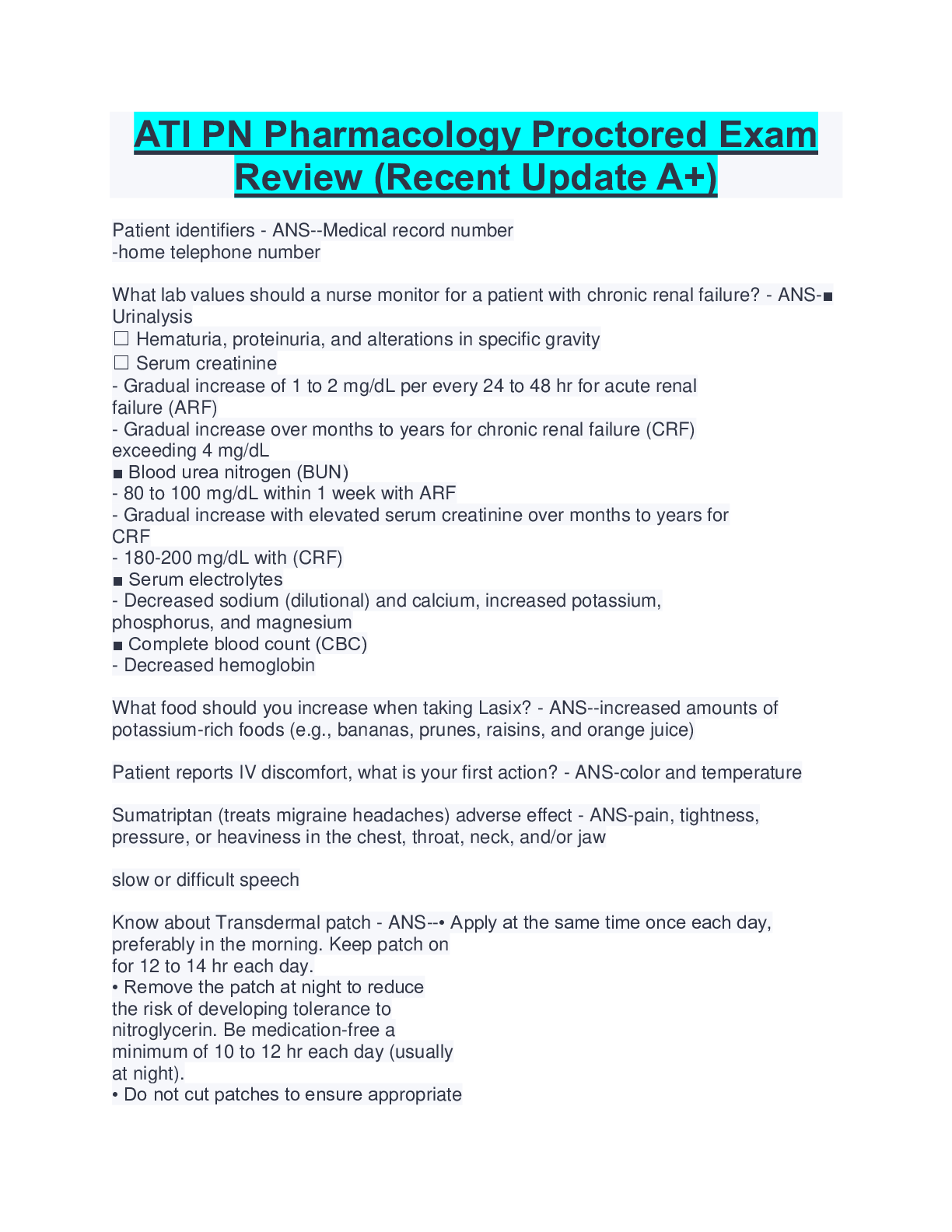
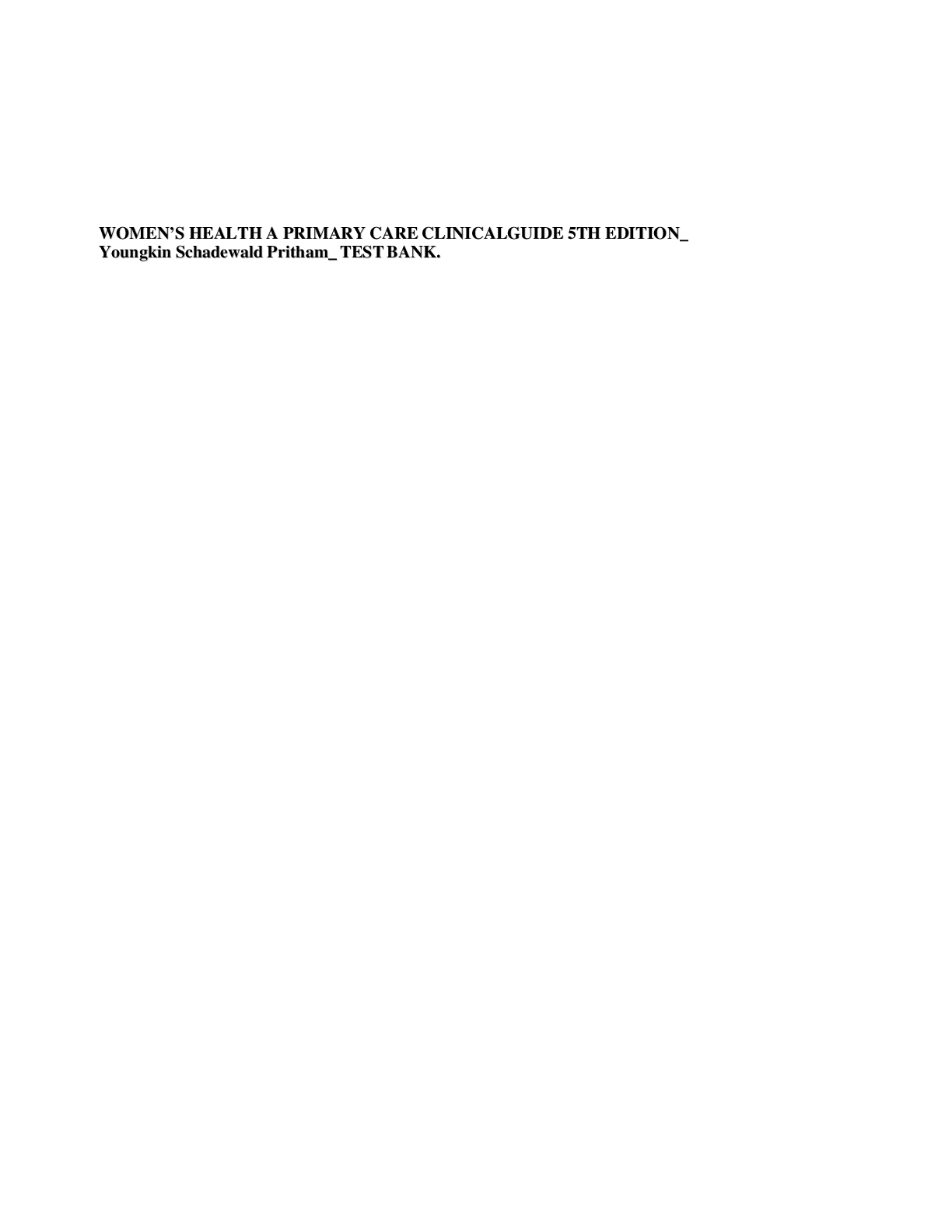
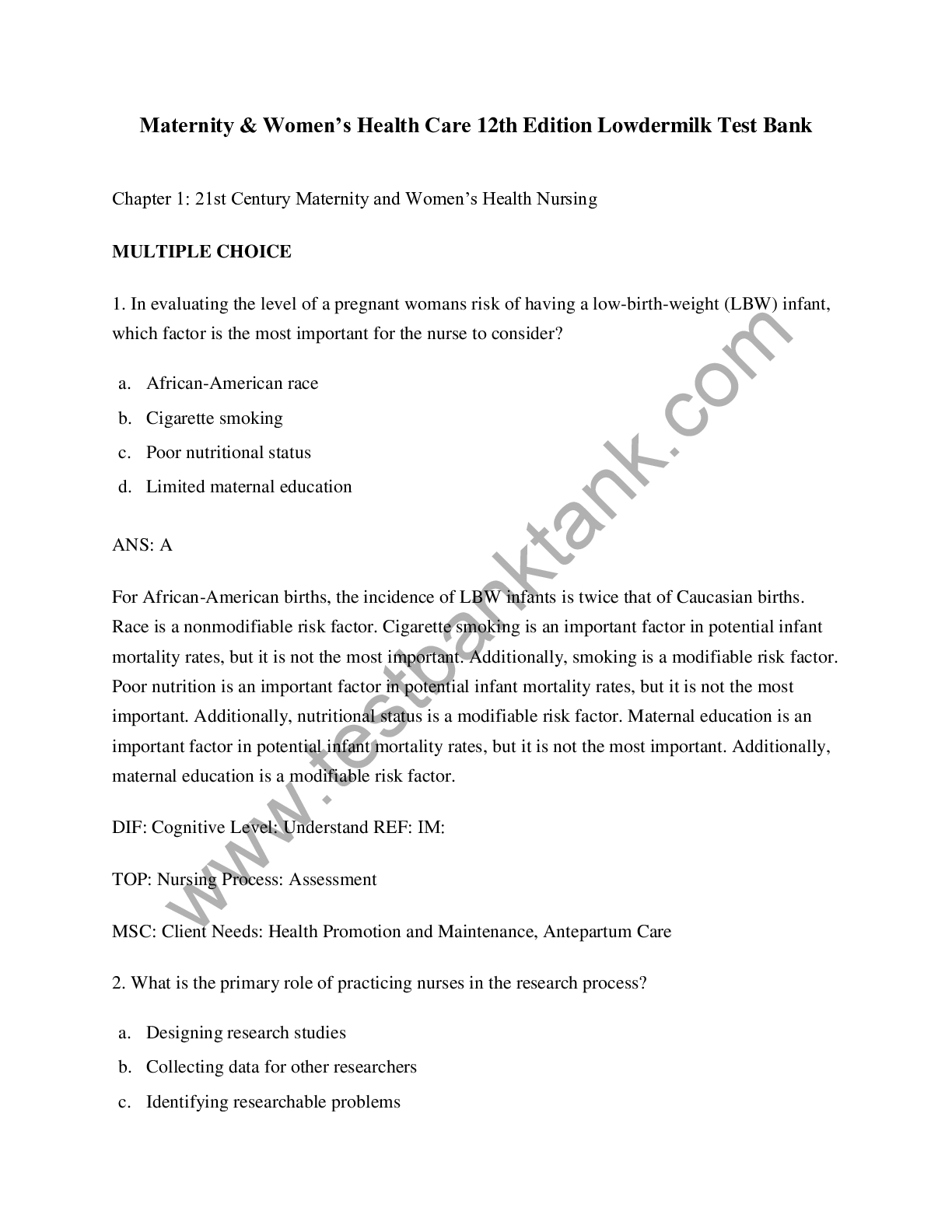

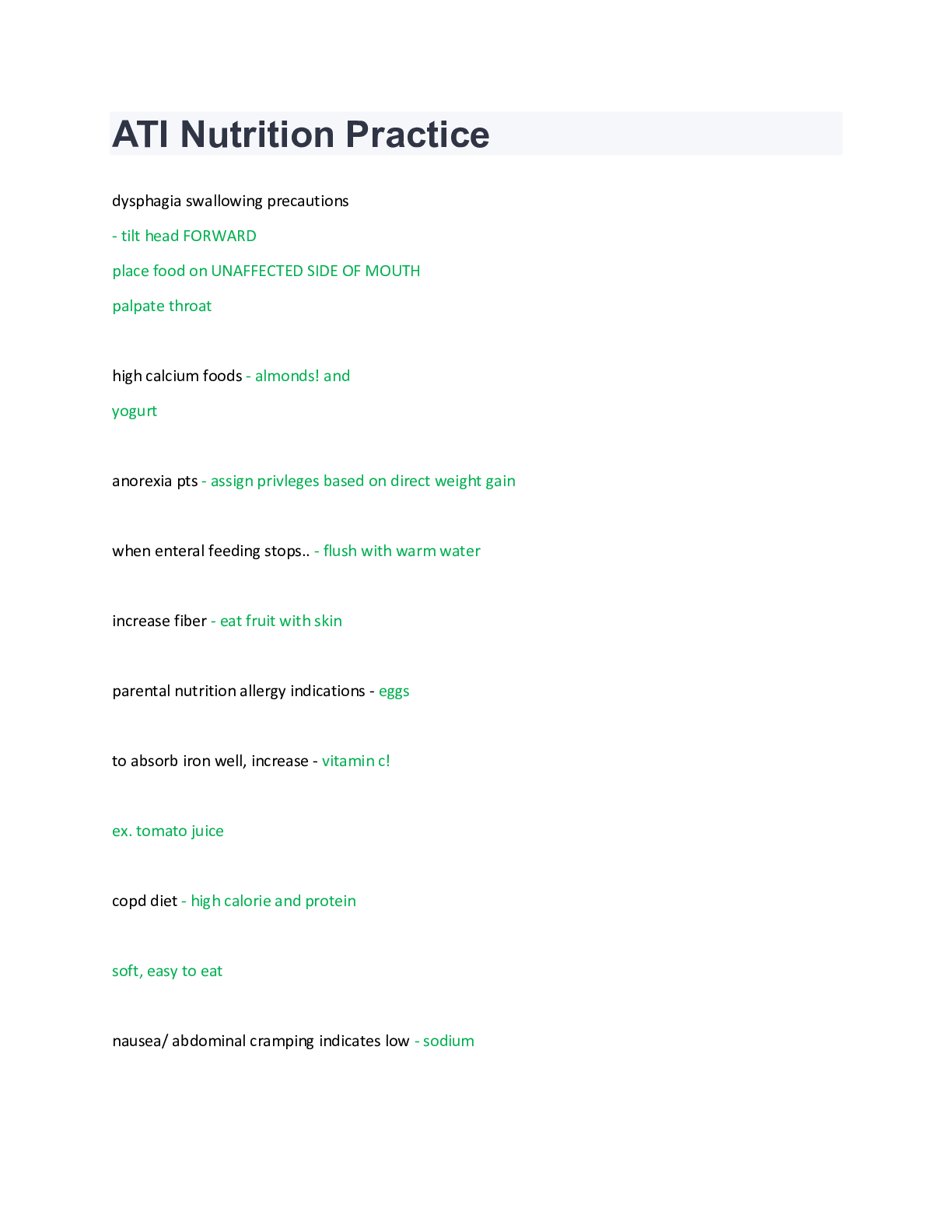
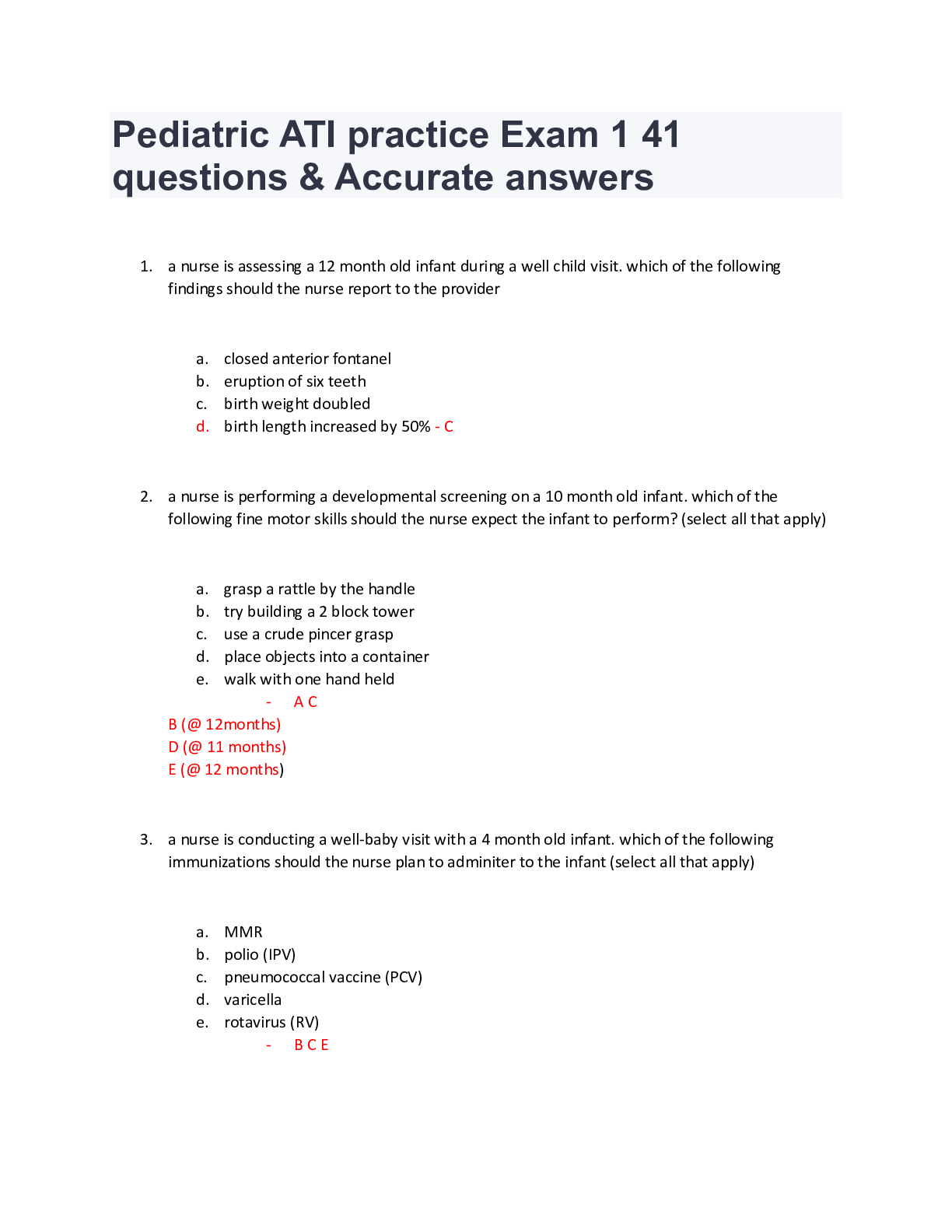
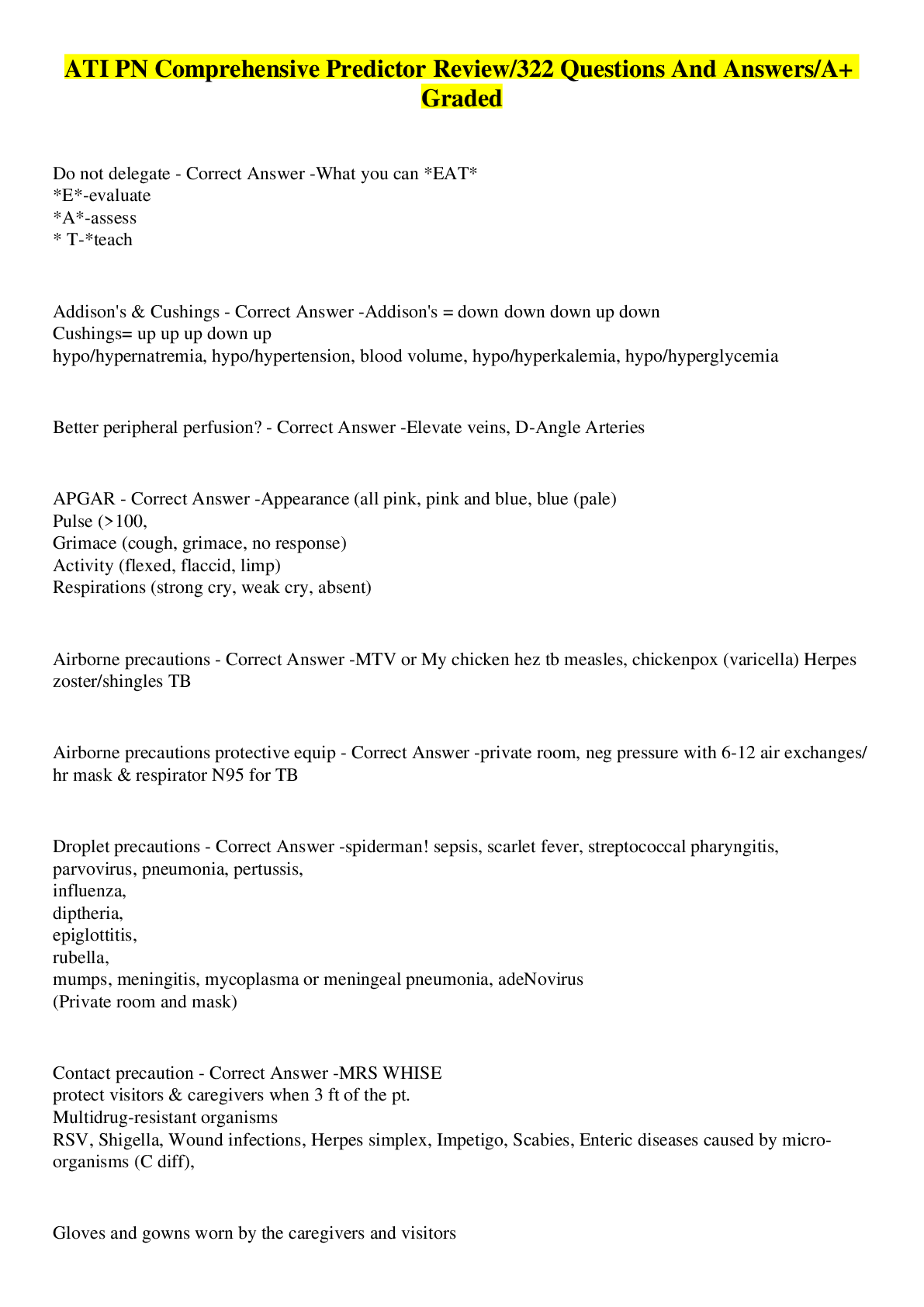
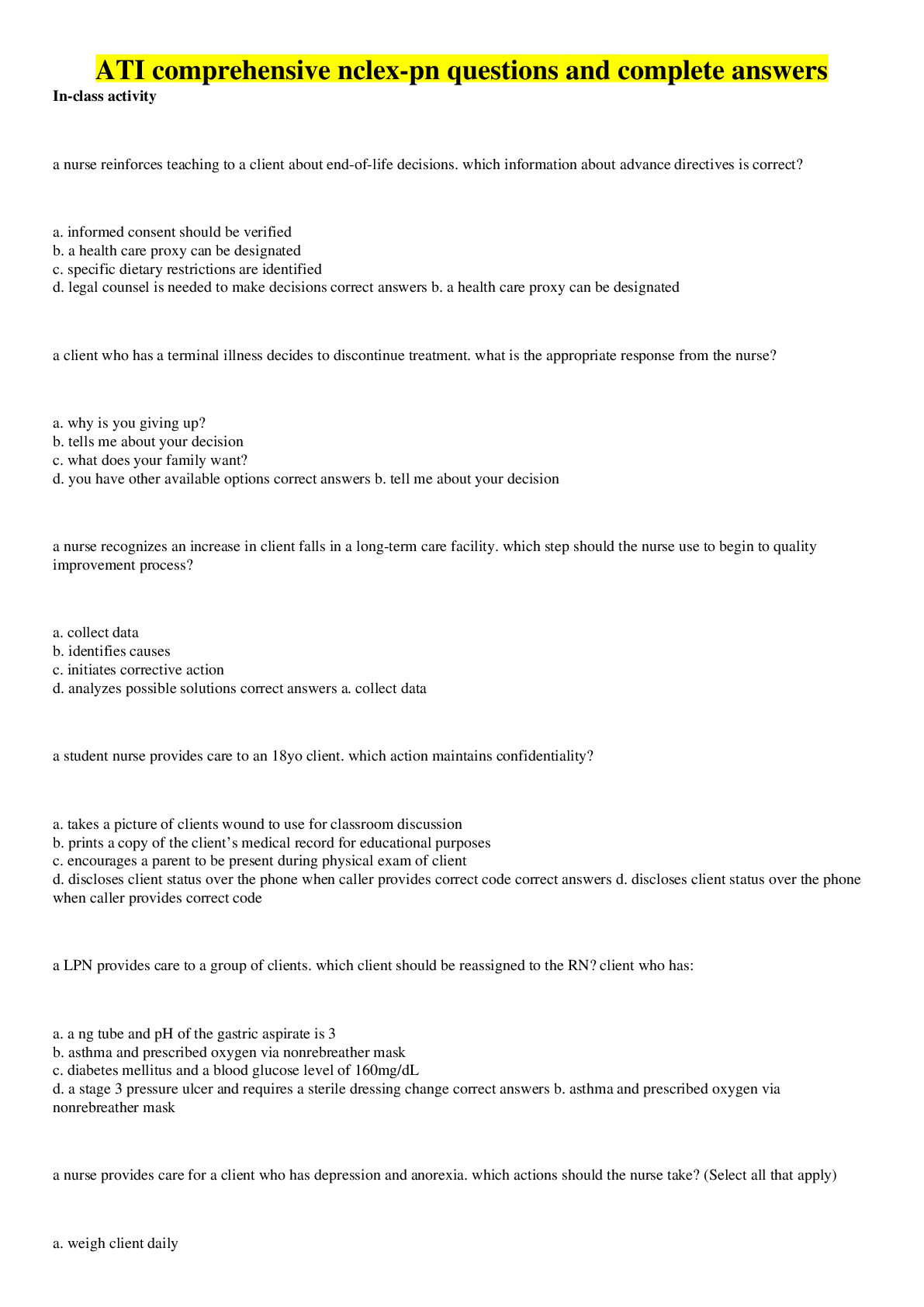


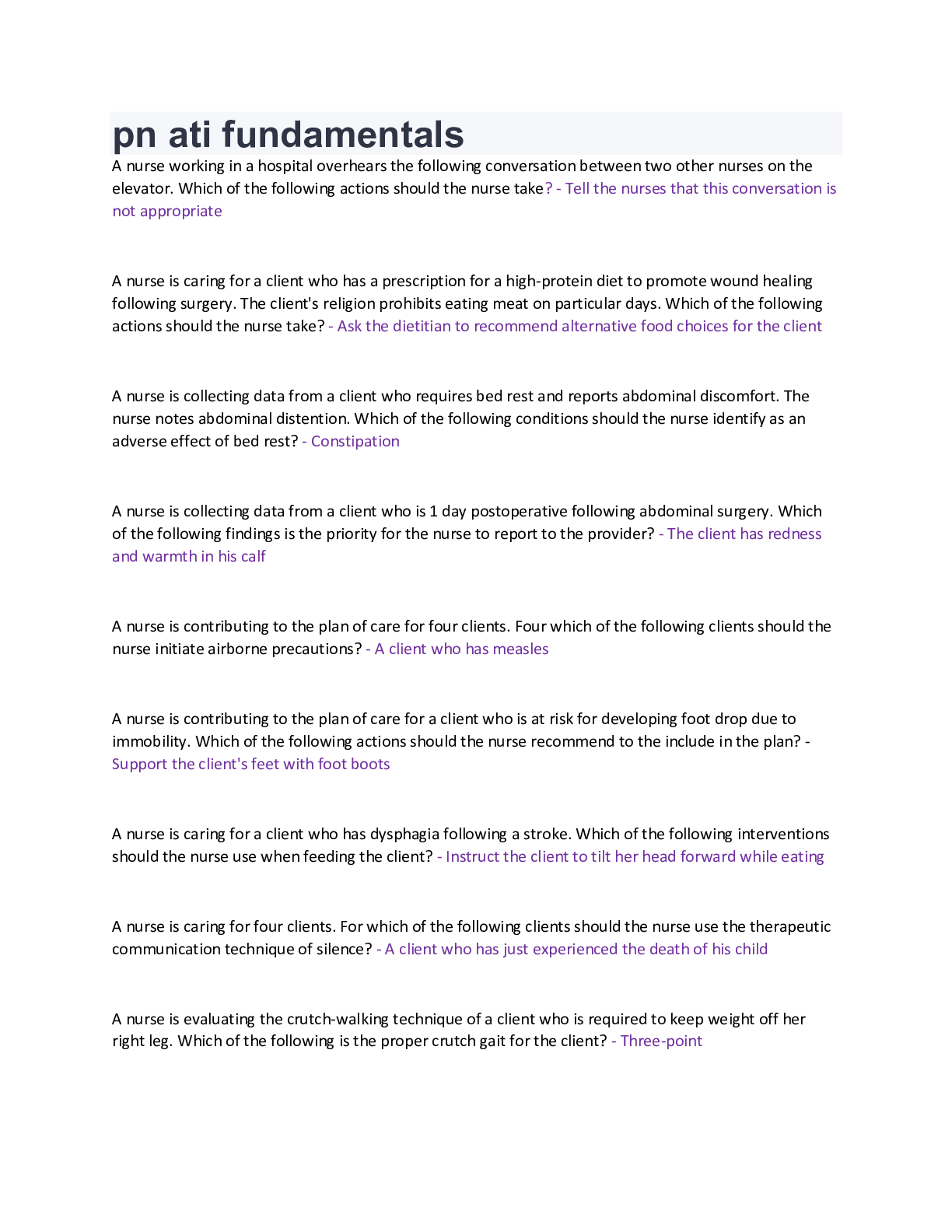


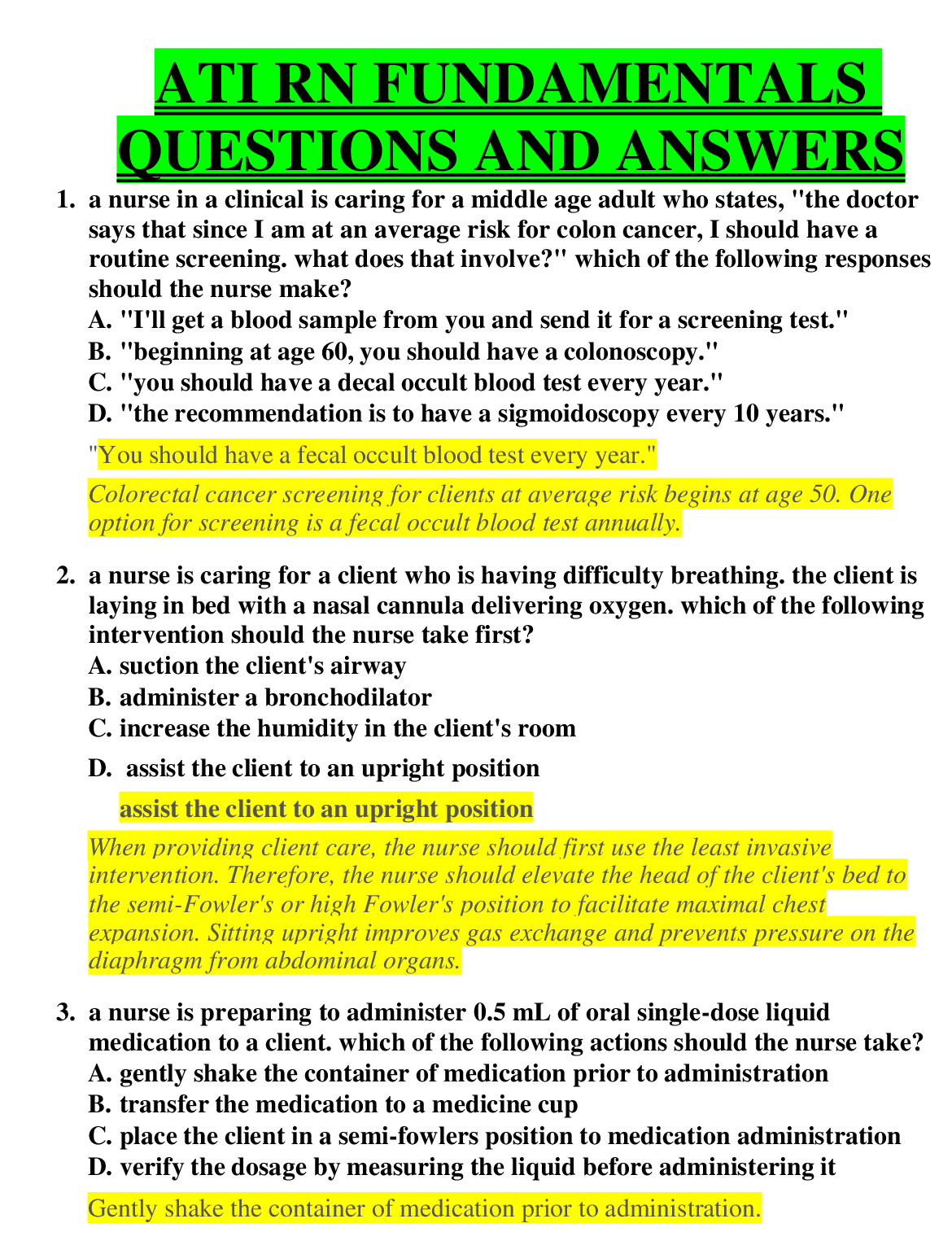
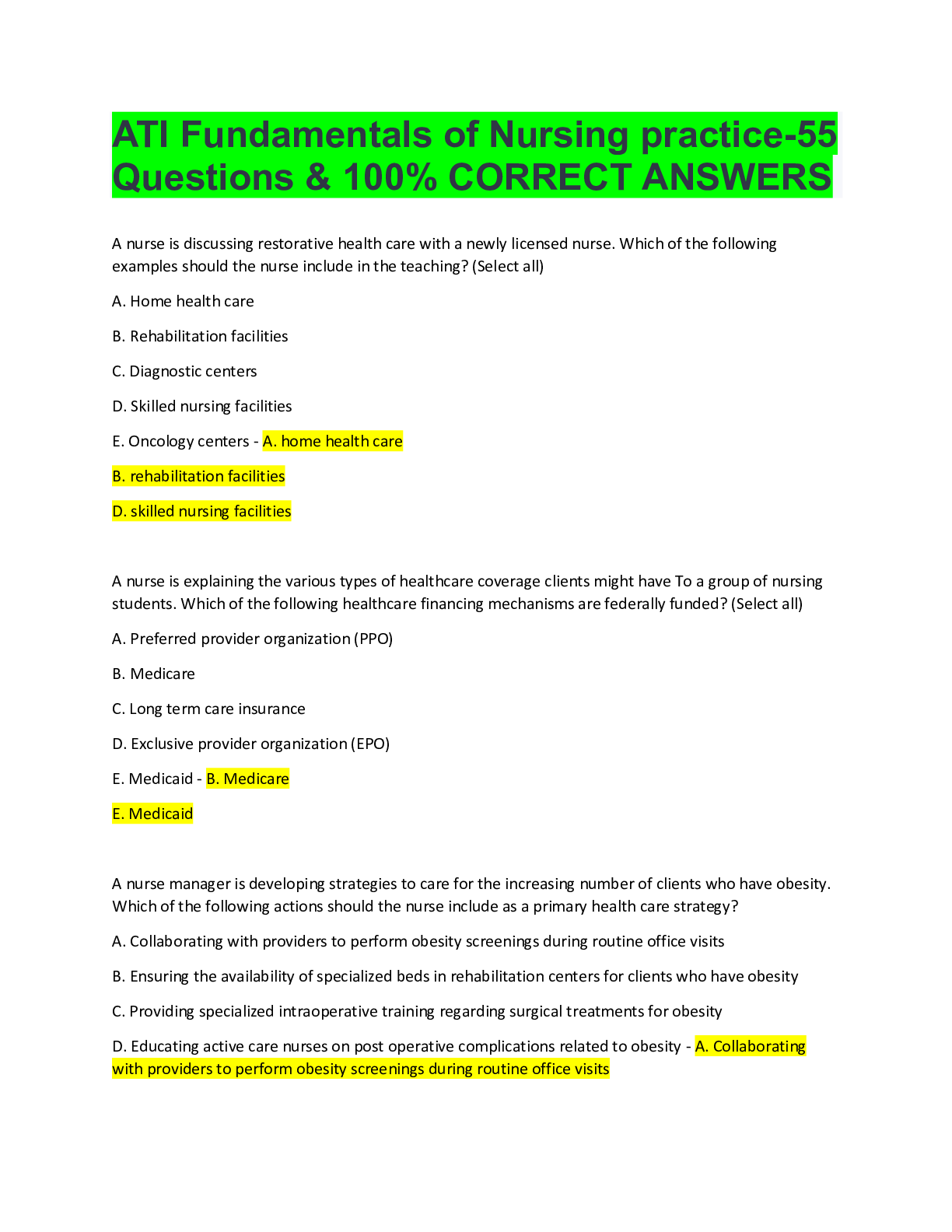
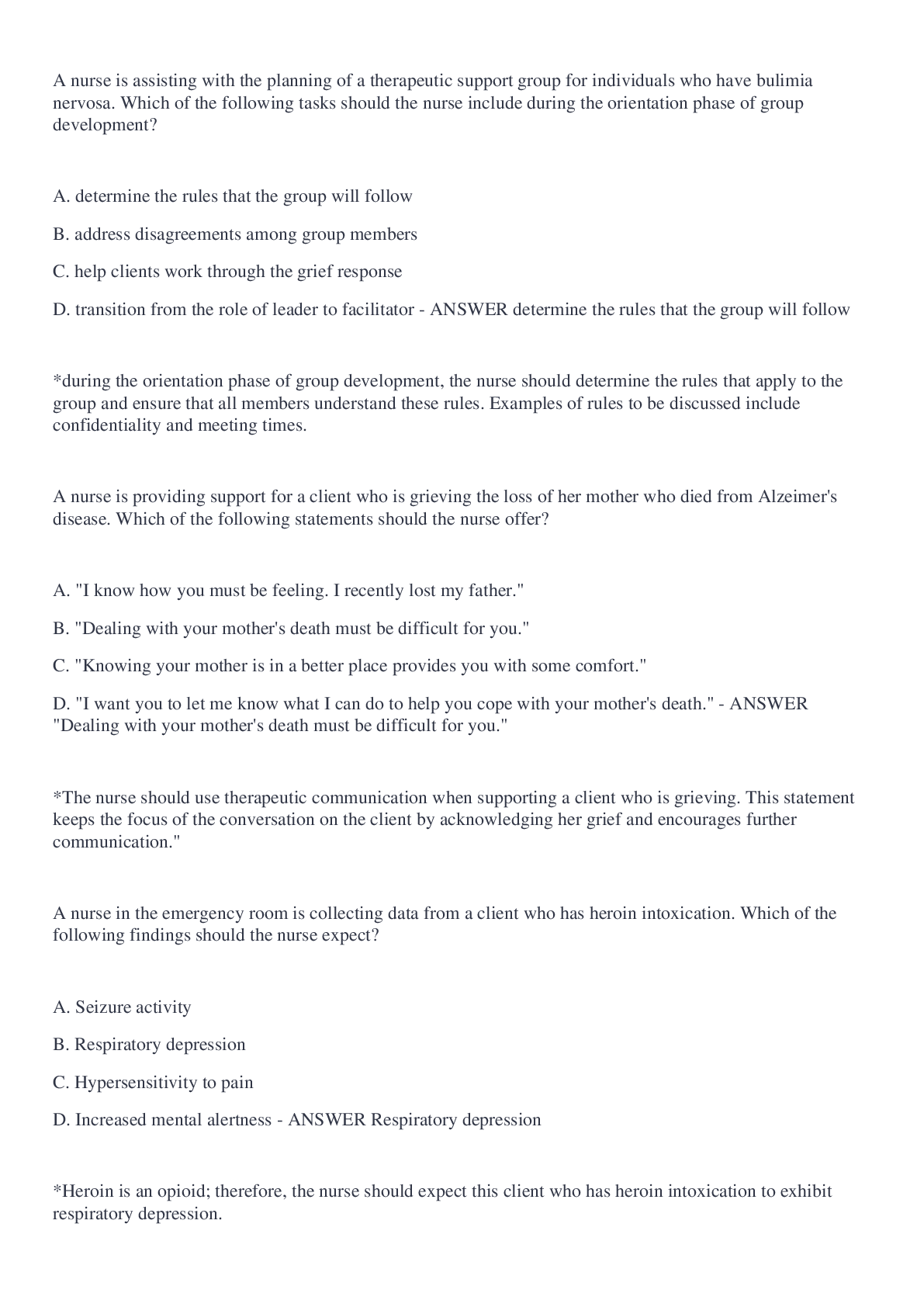

.png)

